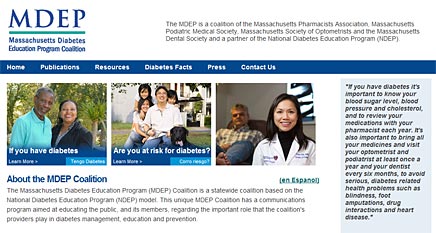Partner Spotlight
Welcome to NDEP’s Partner Spotlight webpage! The page is being updated regularly to feature some of the great activities that our partners are doing to promote NDEP.
The Partner Spotlight features partners who have used creative methods to highlight and promote NDEP’s campaigns and resources.
We Want to Hear from You!
Have you been featured in a local or national media outlet? Do you have a promotion that you’d like to see featured on the Partner Spotlight webpage? First answer these questions:
- Does your promotion highlight NDEP’s campaigns and resources?
- Is your promotion innovative?
- Has the promotion been recently implemented, and are you able to evaluate how it’s doing?
- Are there lessons learned that can help other partners?
If you answered yes to all of these questions, your organization could be featured in the next Partner Spotlight! Complete the submission form to let us know about your activities. Send any photos, media results, and contact information to Ashley Moore at amoore@hagersharp.com.
Migrant Health Promotion Uses NDEP Tools to Implement a “Promotora Community Program” to Improve the Health of Farmworkers and Rural Communities Affected by Diabetes
Background
Migrant Health Promotion (MHP) builds on community strengths to improve health in
farmworker and border communities. MHP’s programs provide peer health education,
increase access to health resources, and bring community members together with health
providers, employers, and policymakers to create positive health changes. MHP’s
great work demonstrates how community leaders, called Promotores and
Promotoras,
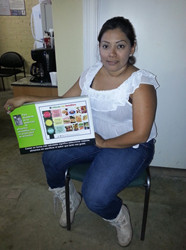 can provide inspiration, direction, and vision necessary to build stronger, healthier
communities.
can provide inspiration, direction, and vision necessary to build stronger, healthier
communities.
Outreach and Promotions
With support from the Texas Department of State Health Services’ Diabetes Program and resources from the NDEP, Migrant Health Promotion implemented a “Promotora Community Program” (PCP) in Hidalgo County, Florida. The goal of the PCP is to promote healthy lifestyle changes by educating community members about their risk for type 2 diabetes and ways to prevent or manage the disease through healthy eating and physical activity.
As part of the PCP, Migrant Health Promotion used NDEP tools to coordinate activities
that are culturally and linguistically appropriate to the population served by MHP.
For example, the program organized cooking and nutrition classes using recipes from
NDEP’s Más que comida, es vida. (It's more than food. It's Life.) bilingual (English
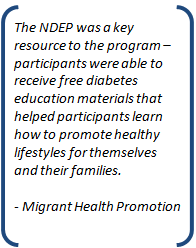 and Spanish) recipe book, teaching people how to how make traditional Mexican food
with healthier, diabetes-friendly ingredients. The program also used NDEP’s bilingual
The Road to Health Toolkit and
Movimiento por su vida music CD to host diabetes
health education sessions and exercise groups focused on encouraging people to make
healthy behavior changes like eating more fruits and vegetables, reading food labels
when grocery shopping, drinking water instead of sugary drinks, and tips for making
physical activity a part of their daily lives.
and Spanish) recipe book, teaching people how to how make traditional Mexican food
with healthier, diabetes-friendly ingredients. The program also used NDEP’s bilingual
The Road to Health Toolkit and
Movimiento por su vida music CD to host diabetes
health education sessions and exercise groups focused on encouraging people to make
healthy behavior changes like eating more fruits and vegetables, reading food labels
when grocery shopping, drinking water instead of sugary drinks, and tips for making
physical activity a part of their daily lives.
As of August 2012, MHP conducted more than 100 sessions with a total of more than 1,500 program participants. Participants reported that their knowledge of diabetes and the importance of healthy eating and physical activity increased, noting that they have started making better food choices and being more active. One participant added, "If it wasn't for the PCP, I would have never made the time to exercise. Since I have joined the exercise group, I feel more motivated, more energetic, and agile."
For more information about Migrant Health Promotion and the Promotora Community Program, visit www.migranthealth.org or contact Colleen Reinert at creinert@migranthealth.org.
Newton Medical Center Uses NDEP Resources to Promote the Theme, “Give Thanks! I Can Help Prevent Diabetes in Myself” in Support of National Diabetes Month
Background
Newton Medical Center (NMC) is a not-for-profit facility dedicated to providing health care services to residents of Harvey, Kansas and surrounding counties, regardless of race, color, sex, age, religion or ability to pay. In support of National Diabetes Month 2012, NMC partnered with community organizations and the NDEP to raise awareness of diabetes and the importance of making lifestyle changes to prevent type 2 diabetes or manage the disease to prevent complications.
Outreach and Promotions
Newton Medical Center and supporting partners sponsored several events during November to promote the theme, “Give Thanks! I Can Help Prevent Diabetes in Myself.”
 To kick off the month, NMC hosted Dinner with the Doctor, a diabetes prevention
panel discussion open to the general public that featured presentations by a family
practice physician, obstetrician/gynecologist, and Certified Diabetes Educator (CDE).
In addition to enjoying a diabetes-friendly dinner, attendees were able to ask questions
about type 2 diabetes prevention and receive educational materials. During the event,
NMC distributed NDEP’s Prevent
Type 2 Diabetes. Step by Step.,
More than 50 Ways to Prevent Diabetes, and
It’s Never Too Early to Prevent Diabetes tip sheets.
To kick off the month, NMC hosted Dinner with the Doctor, a diabetes prevention
panel discussion open to the general public that featured presentations by a family
practice physician, obstetrician/gynecologist, and Certified Diabetes Educator (CDE).
In addition to enjoying a diabetes-friendly dinner, attendees were able to ask questions
about type 2 diabetes prevention and receive educational materials. During the event,
NMC distributed NDEP’s Prevent
Type 2 Diabetes. Step by Step.,
More than 50 Ways to Prevent Diabetes, and
It’s Never Too Early to Prevent Diabetes tip sheets.
Newton Medical Center Primary Care Clinic employees led two “walkabouts” throughout the month to encourage regular exercise. Clinic employees invited the area’s Chambers of Commerce, as well as city leaders, community members, and the local elementary school to join the walks at a local park. A number of hospital employees also led walkabouts along hospital walking paths. Participants received the NDEP’s Small Steps. Big Rewards. Your GAME PLAN to Prevent Type 2 Diabetes booklet as a prize. Children also received NDEP’s Tips for Kids: How to Lower Your Risk for Type 2 Diabetes.
To follow up on this effort, NMC arranged to have CDEs give a presentation to the Chambers of Commerce titled, “Fifteen Minutes to Effective Carb Counting – Help Prevent the Onset of Diabetes” and distributed NDEP’s More than 50 Ways to Prevent Diabetes tip sheet.
Newton Medical Center also coordinated roundtable discussions with doctors and CDEs targeting patients at risk for type 2 diabetes. Doctors mailed their at-risk patients personal letters inviting them to join the roundtable discussions to talk about steps they can take to prevent type 2 diabetes or manage it to prevent complications. To guide the discussions, doctors used NDEP’s Prevent Type 2 Diabetes. Step by Step. tip sheet and The Road to Health Toolkit.
Additional activities during the month included healthy cooking classes hosted by dietitians, and collaborations with other health care facilities, ministries, and community organizations to distribute NDEP materials to at-risk audiences.
Newton Medical Center promoted National Diabetes Month events via the NMC website, electronic signs at the hospital and along the highway, posters in the hospital lobbies, and local media using resources from NDEP’s National Diabetes Month promotional toolkit.
For more information, contact Vallerie Gleason at val.gleason@newmedctr.org.
2012 NDEP Frankie Award Winners
NDEP is pleased to announce the winners of the 2012 Frankie Awards. The Frankie Awards recognize the innovative and effective use and promotion of NDEP materials and resources as the cornerstone of diabetes prevention and control programs and initiatives. They are named in honor of Frank Vinicor, M.D., former director of the Center for Disease Control and Prevention’s (CDC’s) Division of Diabetes Translation (DDT) and a founder of the National Diabetes Education Program (NDEP). All state Diabetes Prevention and Control Programs, organizations, and public or private partners who used NDEP resources to develop prevention and/or control initiatives or incorporated NDEP materials into existing activities between January 2011 and December 2011 were eligible to apply. The Frank Vinicor Award of Excellence recognizes exemplary use or adaptation of NDEP resources in a comprehensive, multifaceted campaign to address behavior change. It is selected from among the winners in the four categories.
Award Winners
Frank Vinicor Award of Excellence
Minnesota Department of Health
Minnesota Diabetes & Heart Health Collaborative Health Literacy Flip Chart
Minnesota has seen explosive growth in the number of residents whose primary language is not English, fuelling already high health disparities. The Minnesota Diabetes and Heart Health Collaborative (MN-DC), a partnership between 17 leading health care organizations, responded to these trends by developing a low literacy patient handout using pictures and a few words (in English, Spanish and Somali) to describe 13 essential self-care activities based on NDEP’s “4 Steps to Control Your Diabetes. For Life.” The flip chart was designed for use with non-English-speaking people, recent immigrants, the deaf and hard of hearing, the elderly, and anyone else struggling to manage their pre-existing diabetes due to low health literacy.
The MN-DC expanded the handout into a scripted flip chart for use by health professionals and lay health educators. The purpose of the flip chart, entitled “Control Your Diabetes for Life!,” was to help people with poor health literacy better understand how to control their diabetes, why it is so important, and where to get help. Our diverse pool of users continue to ask for more – more flip charts, more topics covered in a similar fashion, more translations to the scripted portions, and more goal-setting aids. In 2011, the MN-DC moved to an online version of the flip chart in order to greatly expand the content. The new online materials, introduced in late 2011 and covering 24 topics, additionally drew on content from NDEP’s “Learn About Diabetes,” “Take Care of Your Heart. Manage Your Diabetes” and “Know Your Diabetes ABCs.” More topics are being planned, and NDEP will remain a key source. Flip chart users also asked for, and got, a goal-setting handout that the educator could help the patient complete. We added behavior change tips for the educator, based in part on information in NEDP’s “Diabetes HealthSense.”
Nearly 1,000 flip charts were distributed to health professionals, lay educators, CHWs and nursing instructors, community centers and others. Ten clinics initially piloted the flip chart with over 50 patients. All users found the tool to be effective and all patients said it was helpful.
More information about the flip chart, as well as the complete tool set can be found at http://www.mn-dc.org/literacy.html
Collaborative Partnership Using NDEP Resources
U.S. Preventive Medicine
Macaw Mobile Manager for Diabetes
The purpose of the program was to collaborate on the development of an innovative mobile smartphone application to support diabetes self-management and well-being. The program goal was to develop a smartphone application to support diabetes self-management using NDEP content and resources in conjunction with guidance from NDEP content experts. We started by convening a multidisciplinary panel of experts in diabetes care to direct the content and structure of the mobile application. These experts directed the use of online resources to develop the notifications, schedule of screenings, self-care tasks and assessment questions so that we could create a Diabetes Well-being Score. As a user interacts with the mobile application and completes various tasks, their score increases. Users will be provided daily reminders in the form of a diabetes diary that compiles all the various activities due that day. For instance, the user may have to complete an appointment with their podiatrist, track their glucose and nutrition for the day and indicate that they have taken their medications to complete their activities and thereby increasing their Diabetes Well-being Score.
The team utilized many different publications from the NDEP website in the creation of the program content, trackers, score and self-care tasks. Each publication was referenced and linked to the NDEP site within the application so that the user can read more about that particular topic. Examples of materials used to create the application include: Women and Diabetes, When Your Blood Glucose Is Too High or Too Low, Tips to Help You Stay Healthy, Diabetes Numbers at a Glance, For A Healthy Heart, Control the ABC’s of Diabetes and Be Sweet to Your Feet.
The mobile manager for diabetes has not yet been deployed in a population so that efficacy and impact on hemoglobin A1C or fasting glucose can be measured. However, U.S. Preventive Medicine will conduct several pilot studies to evaluate the effectiveness of the USPM Macaw Mobile Manager for Diabetes.
Promotion of NDEP Resources to Address Disparities
Lake County Tribal Health - Diabetes Prevention Program
Learning to Live in Balance Diabetes Prevention Program
The goal of our “Learning to Live in Balance” 16-week Diabetes prevention classes is to help our low socio-economic population lose 7% of their body weight through healthy eating and exercise. The “Learning to Live in Balance” program has demonstrated the ability to assist participants with preventing or delaying type 2 Diabetes in our rural Native American communities of Lake County. The health behaviors addressed by our program include poor diet and nutrition learned behaviors, lack of physical activity due to little or no motivation, and declining health indicative of Pre-Diabetes. Through our program, patients are encouraged to lose and maintain weight loss by making healthy food choices and increasing physical activity. Patients are taught through a variety of means that include food demos, low-fat recipes that promote intake of vegetables, fruits, whole grains, and legumes in their diet (the three sister combo). Patients are also encouraged to engage in moderate physical activity for at least 150 minutes per week.
An essential resource tool we have incorporated into our program is the National Diabetes Education Program’s “The Road to Health Toolkit.” Our Diabetes Prevention Support Team has studied the training guide and frequently uses the material in their presentations to program participants. The most popular tool used is the GAME PLAN Food and Activity Tracker that we have adapted to assist our participants with recording food, drink and physical activity. The adapted food and activity tracker is user friendly and has helped even our most reluctant participants feel comfortable with beginning to track. What we appreciate about “The Road to Health Toolkit” material most is that it was developed with health literacy in mind. The materials are not too cumbersome and gradually guide participants through learning to change their lifestyle.
Patients have demonstrated significant improvements in weight loss, decrease in blood pressure, healthier ranges of lipid levels and an increase in regular physical activity. More significantly, participants have considerably reduced their HgbA1C which has decreased the incidences of newly diagnosed diabetics among Native prediabetics in Lake County. Our participants leave our “Learning to Live in Balance” Diabetes Prevention Program with an increased knowledge of how to live a healthier lifestyle, feel better, and more importantly, leave empowered to take control of their own health.
Implementation of an NDEP Program or Activity in the Community
San Juan Basin Health Department
Promoviendo la Salud
Promoviendo la Salud (PLS) was designed to screen for chronic disease presence and to educate clients if diabetes was a potential risk or already present. If risk factors were ascertained via lab results, clients were educated along with their friends and families (often in their own homes) by a trained bilingual, bicultural community health worker (promotora). Promoviendo offered Latino adults in two Southwest Colorado counties affordable, culturally sensitive opportunities to engage in preventive healthcare activities and access to health information. The educational sessions (“platicas”) promoted healthy lifestyles, including diet, exercise, and preventive health maintenance (pap smears, self breast exams, etc.). Via the health screenings, clients increased awareness regarding their health status, and received counseling and support to prevent the long-term health problems associated with elevated blood glucose, cholesterol, BMI and blood pressure.
Two promotoras, one in La Plata County and one in Archuleta County completed the NDEP online course intended to teach diabetes educators how to use the “Road to Health Toolkit.” The toolkit which promotes diabetes prevention through lifestyle changes provided excellent companion pieces to the promotoras’ education outreach campaign for Latinos. The toolkit was put to use right away with the promotora’s group platicas and in individual counseling sessions with high-risk clients to discuss lab results. The toolkit materials helped explain key education pieces about diabetes and were excellent resources to help motivate clients toward increased health by fostering healthier eating habits such as choosing appropriate foods at the market, managing portion control and carb counting. The visual aids lent an important experiential component to address adult learning styles. The toolkit was particularly effective for the Latino community including the music CD a promotora utilized for Zumba exercise demonstrations.
In reviewing the overarching goals of the program, the identified disparate populations of Latinos had improved their health status as evidenced the results of client surveys and interviews. The second goal of increasing capacity among providers to serve disparate populations was partially realized in that numerous partners in both counties served on an Advisory Board and became well educated as to the barriers that needed to be addressed. The hospital in La Plata County now has a bilingual patient advocate/navigator and a community clinic is set to open this fall. Archuleta County also has bilingual staff at their community clinic and offers a sliding scale fee. Some of these outcomes also speak to the third goal of increasing community support for policies that improve access to primary and preventive care, and a strengthened safety net for underserved Latino adults in Southwest Colorado.
Use of Media
National Kidney Foundation of Michigan
Communities Against Diabetes
There is a high burden of unmet economic, social, and health support needs in the predominantly African American populations of Flint, NW Detroit, and Inkster, MI. The National Kidney Foundation of Michigan (NKFM), with support from the Centers for Disease Control and Prevention (CDC), aims to reduce morbidity and premature mortality and eliminate health disparities associated with diabetes in these three communities. One of the project’s key objectives is to raise awareness of diabetes and its related complications. By using the National Diabetes Education Program (NDEP) materials and messages in local community centers, health clinics, and housing complexes, as well as in print, radio, and social media outlets, we hope to infuse the community with information and resources to better manage diabetes.
With the help of multiple partner organizations, we used creative strategies to deliver NDEP materials and messages to meet the unique needs of the communities. For example, NDEP’s managing diabetes posters were adapted to connect with the hard-to-reach community members with a photo of a local resident along with their story and message about managing diabetes. These posters were displayed at community locations, and on Facebook pages. Also, NDEP’s Tasty Recipes cookbook, recipe cards, and posters were distributed at cooking classes, restaurant events, grocery store tours, and farmers markets to provide tools to eating a healthy, diabetes friendly diet. Dozens of NDEP campaigns, messages, and materials were implemented over the course of this project. To maintain consistency, we implemented a targeted campaign using the phrase “Control Your ABCs” to raise awareness across the 3 at-risk communities. The ABCs message was tagged onto all messages, tweets, Facebook posts, and press releases. Multiple community organizations and businesses have embraced the NDEP posters and materials and have committed to making them prominently visible to their patrons and guests.
Over 40 partner organizations regularly distribute printed NDEP materials through their organization - to patients at free clinics, at local grocery stores, fitness organizations, restaurants, and local businesses. Social media has been another very successful way to distribute NDEP messages to community members and organizations. Each coalition has a Facebook page to share information and NDEP messages. Combined, the coalition Facebook pages have nearly 200 fans and over 14,000 view posts in the last year. The NKFM Twitter page has 485 followers, which has nearly quadrupled in the last year. It is estimated that NDEP messages have reached up to 55,000 Twitter users. Several diabetes-related messages were re-tweeted 108 times by other Twitter users, reaching 155,000 people. In addition, over 55 newspaper articles were printed in the last year, reaching an estimated 386,300 readers. As part of the Diabetes ABCs Campaign, a radio commercial as well as public service announcements and digital advertisements were aired in the communities (with a reach of 648,000 adults on air, plus 78,729 monthly streaming and mobile visitors). There were also three television interviews on metro-Detroit outlets. Two interviews that appeared on the local CBS station discussed fighting diabetes in Southeast Michigan, and an interview on another local station talked about fitness and diabetes management. Television interviews aired in the community to raise awareness of the importance of managing diabetes.
NDEP would like to acknowledge this year’s judges: Pamela Geis, Carol Mallette, and Brenda Ralls. The work of the judges was instrumental in selecting programs to recognize from among the many high quality submissions received this year. NDEP is grateful for the support and dedication of all its partners in promoting and using NDEP resources.
Health Education on Wheels Collaborates with Community Organizations to Share NDEP’s Diabetes Information Where People Live, Work, Play, and Worship
Background
Founded in 2007, Health Education on Wheels (HEOW) is a community-based nonprofit organization based in New York with a mission to provide free, accessible health information, education and diagnostic services to individuals with preventable diseases. Recognizing the health effects of diabetes and the increased risk among immigrant populations living in New York, Health Education on Wheels partners with various community health organizations to coordinate outreach events at local churches, parks, hospitals, health fairs, and other community venues.
Outreach and Promotions
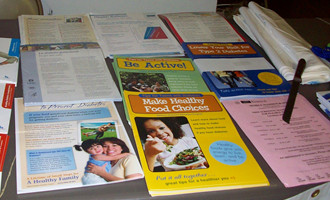 To raise awareness and help educate members of a local church in Brooklyn, HEOW
partnered with the Brooklyn Hospital Center, Bayer HealthCare, Chase Bank, family
counseling services, and many other community organizations to host a health fair
in front of the church. During the health fair themed “Spring to Good Health and
Drive Away Diabetes,” HEOW used NDEP’s
Road to Health toolkit to talk with people about prevention of
type 2 diabetes and shared NDEP’s diabetes prevention tip sheets – including
Tips for Teens and
Did You Have Gestational Diabetes When You Were Pregnant? What You Need to Know..
– to help people make changes to delay or prevent the disease.
To raise awareness and help educate members of a local church in Brooklyn, HEOW
partnered with the Brooklyn Hospital Center, Bayer HealthCare, Chase Bank, family
counseling services, and many other community organizations to host a health fair
in front of the church. During the health fair themed “Spring to Good Health and
Drive Away Diabetes,” HEOW used NDEP’s
Road to Health toolkit to talk with people about prevention of
type 2 diabetes and shared NDEP’s diabetes prevention tip sheets – including
Tips for Teens and
Did You Have Gestational Diabetes When You Were Pregnant? What You Need to Know..
– to help people make changes to delay or prevent the disease.
In addition, HEOW partnered with three community health organizations to host a
seminar focused on type 2 diabetes. During the seminar, participants discussed the
importance of lifestyle changes – losing 5-7 percent of their body weight, eating
healthy foods,
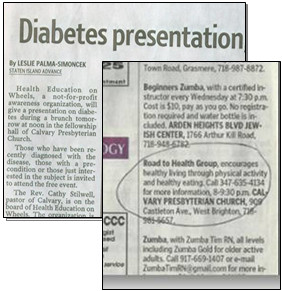 and exercise – to prevent type 2 diabetes or manage the disease. HEOW used and shared
a variety of NDEP messages and resources to help participants learn about diabetes
and healthy habits, including
Small Steps. Big Rewards. Your Game Plan to Prevent Type 2 Diabetes,
the Fat and Calorie Counter, and
Two Reasons I Find Time to Prevent Diabetes.
and exercise – to prevent type 2 diabetes or manage the disease. HEOW used and shared
a variety of NDEP messages and resources to help participants learn about diabetes
and healthy habits, including
Small Steps. Big Rewards. Your Game Plan to Prevent Type 2 Diabetes,
the Fat and Calorie Counter, and
Two Reasons I Find Time to Prevent Diabetes.
HEOW also organized monthly, hour-long presentations using the 12 sessions from NDEP’s Power to Prevent program. During the sessions, HEOW presented on information from Power to Prevent curriculum to help participants learn about diabetes, diabetes risk factors, steps people can take to delay or prevent type 2 diabetes, and other helpful resources from the NDEP such as the Diabetes Risk Test and type 2 diabetes prevention resources available on the NDEP website.
To promote these outreach events and offerings from the NDEP, HEOW developed a diabetes page on its website, distributes weekly advertisements in the health section of the local newspaper, and distributes information at local parks and hospitals.
For more information, contact Mr. William Addo at waddo@healtheducationonwheels.org.
The Texas Diabetes Institute/University Health System/Diabetes Education Department Promotes NDEP’s Resources to Help People Make Changes to Live Well
Background
 The mission of the
Texas Diabetes Institute/University Health System/Diabetes Education Department
is to prevent diabetes and its complications through health promotion, patient education,
professional training, treatment, and research. Through a comprehensive team of
diabetes specialists – family physicians, endocrinologists, renal specialists, orthopedists,
ophthalmologists, dermatologists, podiatrists, and wound care specialists – the
Institute works to promote healthy lifestyles and teach people the skills needed
to live with diabetes and avoid serious complications.
The mission of the
Texas Diabetes Institute/University Health System/Diabetes Education Department
is to prevent diabetes and its complications through health promotion, patient education,
professional training, treatment, and research. Through a comprehensive team of
diabetes specialists – family physicians, endocrinologists, renal specialists, orthopedists,
ophthalmologists, dermatologists, podiatrists, and wound care specialists – the
Institute works to promote healthy lifestyles and teach people the skills needed
to live with diabetes and avoid serious complications.
Outreach and Promotions
As part of their National Diabetes Month 2011 promotions, the Texas Diabetes Institute used NDEP’s resources to reach minority populations with diabetes – and health care professionals working with patients who have diabetes – with tools and messages to help people make behavior changes to live well.
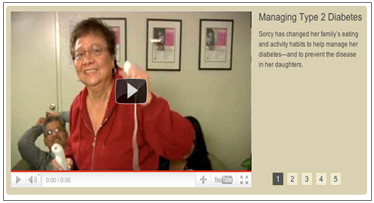 The Institute hosted a two-day “Diabetes Educator Review Course” for health care
professionals. During the course, NDEP’s
behavior change videos were played and highlighted as resources for health
care professionals to use with their patients. The Institute also held workshops
and healthy cooking classes where they distributed NDEP’s
Small Steps. Big Rewards. Your GAME PLAN to Prevent Type 2 Diabetes
in English and Spanish. In addition, NDEP
posters with messages about managing and preventing diabetes in English
and Spanish were displayed on bulletin boards throughout the facility.
The Institute hosted a two-day “Diabetes Educator Review Course” for health care
professionals. During the course, NDEP’s
behavior change videos were played and highlighted as resources for health
care professionals to use with their patients. The Institute also held workshops
and healthy cooking classes where they distributed NDEP’s
Small Steps. Big Rewards. Your GAME PLAN to Prevent Type 2 Diabetes
in English and Spanish. In addition, NDEP
posters with messages about managing and preventing diabetes in English
and Spanish were displayed on bulletin boards throughout the facility.
Through these activities, the Texas Diabetes Institute was able to reach more than 500 patients with diabetes and their family members, and more than 75 health care professionals who work with patients with diabetes. According to the Institute, one of the greatest successes was exposing so many health care professionals to NDEP’s behavior change resources so that they could use them in their own settings in the future.
For more information, contact Elda Balle at Elda.Balle@uhs-sa.com. Visit www.YourDiabetesInfo.org/DiabetesMonth to explore NDEP’s behavior change tools and promotional resources that you can use to promote National Diabetes Month in your community.
The National Association of School Nurses Promotes NDEP’s School Guide and Other Resources via Workshops and Online Outreach
Background
The mission of the National Association of School Nurses (NASN) is to advance the specialty practice of school nursing to improve the health and academic success of all students. As a program partner, NASN regularly promotes NDEP offerings to its network of more than 15,000 members, reaching school nurses, parents, and members of the school community across the country with important diabetes information. This year, NASN continued to support NDEP by highlighting program offerings through a variety of communication channels, including conferences and workshops, the NASN website, and the NASN Weekly Digest.
Outreach and Promotions
 NASN was a critical partner in helping NDEP update and revise the
Helping the Student with Diabetes Succeed: A Guide for School Personnel (School
Guide) released in 2010 and has found multiple ways to promote
this resource to school health professionals year round. Recently, NASN invited
Joanne Gallivan, NDEP Director, and Martha Funnell, Former NDEP Chair, to present
at the NASN 44th Annual Conference on “Self-Directed Behavior Change: Resources
to Improve Diabetes Outcomes at School” to help students who have or are at risk
for diabetes make changes in behavior. NASN also distributed more than 50 School
Guide binders to nurses at a pre-conference program.
NASN was a critical partner in helping NDEP update and revise the
Helping the Student with Diabetes Succeed: A Guide for School Personnel (School
Guide) released in 2010 and has found multiple ways to promote
this resource to school health professionals year round. Recently, NASN invited
Joanne Gallivan, NDEP Director, and Martha Funnell, Former NDEP Chair, to present
at the NASN 44th Annual Conference on “Self-Directed Behavior Change: Resources
to Improve Diabetes Outcomes at School” to help students who have or are at risk
for diabetes make changes in behavior. NASN also distributed more than 50 School
Guide binders to nurses at a pre-conference program.
Additionally, NASN distributed 108 copies of NDEP’s School Guide and Teen Tip Sheets at two “Helping Administer to the Needs of the Student with Diabetes in School” (H.A.N.D.S.℠) workshops, a continuing education program developed by the association to educate school nurses about effective diabetes management for students. NASN also highlights the School Guide as a resource on the www.NASN.org website using the promotional web button.
![]() In addition to promoting the School Guide, NASN frequently includes information
about NDEP’s resources in their e-newsletter, the NASN Weekly Digest, which reaches
more than 30,000 readers. Using content from NDEP’s News & Notes e-newsletter, NASN
is able to quickly adapt relevant NDEP messages to share with readers. For example,
NASN highlighted NDEP’s behavior change resources, such as the New Year’s Resolution
Maker, Make a Plan,
Just One Step,
and Diabetes HealthSense
resources for teachers and school health professionals.
In addition to promoting the School Guide, NASN frequently includes information
about NDEP’s resources in their e-newsletter, the NASN Weekly Digest, which reaches
more than 30,000 readers. Using content from NDEP’s News & Notes e-newsletter, NASN
is able to quickly adapt relevant NDEP messages to share with readers. For example,
NASN highlighted NDEP’s behavior change resources, such as the New Year’s Resolution
Maker, Make a Plan,
Just One Step,
and Diabetes HealthSense
resources for teachers and school health professionals.
For more information about these activities, contact Sarah Butler at sbutler@nasn.org, or click here to learn how you can promote NDEP’s School Guide and other resources to engage youth to prevent and manage their diabetes.
The Washington Association of Community & Migrant Health Centers Uses NDEP Resources to Host a Workshop in Support of National Minority Health Month
Outreach and Promotions
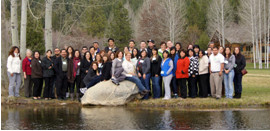 In observance of National Minority Health Month in April, the Washington Association
of Community & Migrant Health Centers, through the Washington Community Health Workers/Promotores
Network (WCHWN), coordinated and co-sponsored a “7th Annual Spring Intensive Training
for Health Promoters and Community Health Workers.”
In observance of National Minority Health Month in April, the Washington Association
of Community & Migrant Health Centers, through the Washington Community Health Workers/Promotores
Network (WCHWN), coordinated and co-sponsored a “7th Annual Spring Intensive Training
for Health Promoters and Community Health Workers.”
The 2 1/2 day event – which included various workshops, presentations, and activities – provided training on core competencies and skills promotoras need to effectively do their job, including organization, documentation, evaluation, and coordination skills. There was also training to address emergency preparedness, labor rights and health insurance options in Washington State, and diabetes prevention. During these trainings, attendees learned basic but core information about how to communicate what they learned to the communities, and where to get additional information and assistance.
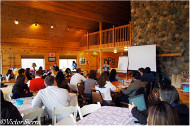 This year, Betsy J. Rodríguez conducted a live webinar presenting NDEP’s new
Do it for them! But for you too. (¡Hazlo por ellos! Pero por ti también) fotonovela
and strategies that NDEP has created to reach and educate the Latino community.
The fotonovela was created to educate Hispanic/Latina women who are at high risk
of developing type 2 diabetes themselves and whose family members are at high risk.
This year, Betsy J. Rodríguez conducted a live webinar presenting NDEP’s new
Do it for them! But for you too. (¡Hazlo por ellos! Pero por ti también) fotonovela
and strategies that NDEP has created to reach and educate the Latino community.
The fotonovela was created to educate Hispanic/Latina women who are at high risk
of developing type 2 diabetes themselves and whose family members are at high risk.
Additionally, Francisco Arias-Reyes, a Health Services Consultant at the Washington State Department of Health Heart, Stroke, and Diabetes Program, conducted an interactive workshop using NDEP’s The Road to Health Toolkit, which addresses prevention of type 2 diabetes.
Evaluation & Lessons Learned
The event attracted a diverse group of 68 community leaders from seven community health centers, one hospital, three government agencies, and 10 non-profit organizations. Participants included health workers, health promoters, coordinators, agricultural workers, outreach workers, and health educators.
Following the webinar featuring NDEP’s Do it for them! But for you too. fotonovela, attendees read the story and shared their comments about the resource and how they plan to use it in the future. Many people commented that the resource is easy to understand, teaches people how to care for their community, family, friends, and provides ideas for how to teach. Attendees also responded positively to The Road to Health Toolkit workshop. Many people expressed that the toolkit was very useful and that they would share with friends, family and the community.
Some lessons learned from this event include:
- Ensure that participants can apply what they have learned. A balance between theory and practice can be very effective.
- Educational technology training webinars can be very effective; however, it is better in person.
- To ensure success, these workshops must be planned and designed very carefully. It was worth the effort planning The Road to Health workshop and the webinar-premier of the new NDEP fotonovela.
- A successful implementation begins and ends with a successful partnership!
For more information, contact Lilia Gomez at LGomez@wacmhc.org.
Maureen Sullivan-Tevault Promotes NDEP Messages and Resources on Her Online Radio Program
Background
 Maureen Sullivan-Tevault, R.N., C.E.N., C.D.E., is a long-time partner of the National
Diabetes Education Program (NDEP) and regularly participates in the Program’s promotional
activities. In addition to her health-related credentials, Maureen is also a stand
up comic. She marries her interest and expertise in the two fields in the online
radio show she co-hosts with her husband, Mike Tevault, R.N., called, The Health
and Humor Hour. The program uses light-hearted humor to raise awareness of important
health issues and to share critical health information. Maureen recently promoted
the NDEP on the program and actively engaged NDEP via social media as well.
Maureen Sullivan-Tevault, R.N., C.E.N., C.D.E., is a long-time partner of the National
Diabetes Education Program (NDEP) and regularly participates in the Program’s promotional
activities. In addition to her health-related credentials, Maureen is also a stand
up comic. She marries her interest and expertise in the two fields in the online
radio show she co-hosts with her husband, Mike Tevault, R.N., called, The Health
and Humor Hour. The program uses light-hearted humor to raise awareness of important
health issues and to share critical health information. Maureen recently promoted
the NDEP on the program and actively engaged NDEP via social media as well.

Outreach and Promotions
In March, Maureen focused her program on Diabetes Alert Day. During the hour-long show, Maureen engaged her audience with key NDEP messages to raise awareness and educate viewers about diabetes, diabetes risk factors, steps people can take to delay or prevent type 2 diabetes, and local and national diabetes resources. In supporting NDEP, Maureen promoted the Diabetes Risk Test, NDEP website, and NDEP Facebook page. NDEP’s public service announcements (PSAs) were also displayed on the radio set for online viewers to see. In addition to promoting NDEP resources, Maureen broadcasted an audio clip featuring an interview with NDEP Chair, Dr. John Buse, speaking about Diabetes Alert Day and the importance of knowing your risk for type 2 diabetes.
Maureen used social media to promote the NDEP and the diabetes-focused program on
her Twitter page.
 To date, there have been more
than 600 views to Maureen’s show focusing on Diabetes Alert Day. To learn more about
using online and social media tools to promote your work with the NDEP, check out
the Program’s social media web page.
To date, there have been more
than 600 views to Maureen’s show focusing on Diabetes Alert Day. To learn more about
using online and social media tools to promote your work with the NDEP, check out
the Program’s social media web page.
For more information about Maureen’s activities, email her at Maureen@MaureenSullivanRN.com.
The International Council on Active Aging Joins NDEP in Promoting Healthy Living for Older Adults Managing or Preventing Diabetes
Background
 Founded in October 2001, the
International Council on Active Aging
(ICAA) is dedicated to changing the way we age by uniting professionals in the retirement,
assisted living, fitness, rehabilitation and wellness fields to dispel society''s
myths about aging. The ICAA works with NDEP to provide professionals who work with
older adults resources for promoting diabetes prevention and management. The ICAA
regularly shares NDEP messages and resources through a variety of print and online
channels with its network of individual professionals and 9,200 organizations focused
on active aging.
Founded in October 2001, the
International Council on Active Aging
(ICAA) is dedicated to changing the way we age by uniting professionals in the retirement,
assisted living, fitness, rehabilitation and wellness fields to dispel society''s
myths about aging. The ICAA works with NDEP to provide professionals who work with
older adults resources for promoting diabetes prevention and management. The ICAA
regularly shares NDEP messages and resources through a variety of print and online
channels with its network of individual professionals and 9,200 organizations focused
on active aging.
Outreach and Promotions
To help its members raise awareness and educate older adults about diabetes prevention and management, the ICAA created a National Diabetes Education Program Information Center page on its website. The page highlights NDEP’s offerings for older adults, such as the Power to Control Diabetes is in Your Hands, It’s Not Too Late To Prevent Diabetes, and The Road to Health Toolkit.
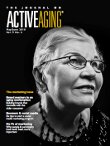 Additionally, the ICAA regularly
includes information about NDEP in weekly newsletters and promotes NDEP public service
announcements in its member publication,
The Journal on Active Aging. Reaching more than 9,000 readers, the
journal provides relevant research and ideas for wellness programs – a great channel
for raising awareness of diabetes prevention and management.
Additionally, the ICAA regularly
includes information about NDEP in weekly newsletters and promotes NDEP public service
announcements in its member publication,
The Journal on Active Aging. Reaching more than 9,000 readers, the
journal provides relevant research and ideas for wellness programs – a great channel
for raising awareness of diabetes prevention and management.
For example, the journal featured an article written by NDEP subject matter experts
focused on prevention of type 2 diabetes. The goal of the article was to educate
active aging professionals about type 2 diabetes and the results of the Diabetes
Prevention Program study,
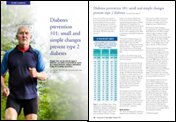 which showed that modest lifestyle changes such as weight loss, healthy eating,
and physical activity could help prevent or delay the onset of diabetes in older
adults. The article promoted NDEP tools and publications including the
At-Risk Weight Charts, the
Small Steps. Big Rewards. Your GAME PLAN to Prevent Type 2 Diabetes
booklet, and the NDEP website.
which showed that modest lifestyle changes such as weight loss, healthy eating,
and physical activity could help prevent or delay the onset of diabetes in older
adults. The article promoted NDEP tools and publications including the
At-Risk Weight Charts, the
Small Steps. Big Rewards. Your GAME PLAN to Prevent Type 2 Diabetes
booklet, and the NDEP website.
For more information, or to get involved with ICAA''s Active Aging Week activities in September, visit the ICAA website or contact Colin Milner at colinmilner@ICAA.cc.
The Diabetes Community Action Coalition of Fulton County Rallies against Diabetes
Background
 The Diabetes Community Action
Coalition of Fulton County in Atlanta, Georgia hit the streets to promote and distribute
NDEP’s messages to high-risk minority populations at worksites, free clinics,
health fairs, senior centers, the YMCA, various meetings, and neighborhood events
throughout the city of Atlanta. Formed in March 2011, the Coalition collaborates
with over 90 member organizations in an effort to reduce the health and financial
burden that diabetes is placing on the county.
The Diabetes Community Action
Coalition of Fulton County in Atlanta, Georgia hit the streets to promote and distribute
NDEP’s messages to high-risk minority populations at worksites, free clinics,
health fairs, senior centers, the YMCA, various meetings, and neighborhood events
throughout the city of Atlanta. Formed in March 2011, the Coalition collaborates
with over 90 member organizations in an effort to reduce the health and financial
burden that diabetes is placing on the county.
Outreach and Promotions
 The Coalition developed a diabetes awareness campaign using and adapting NDEP materials,
including NDEP’s
4 Steps to Control Your Diabetes. For Life.,
Small Steps. Big Rewards. Your GAME PLAN to Prevent Type 2 Diabetes,
and “Know
Your Diabetes ABCs, Just Like You Know Your Other Numbers” print PSA,
which was modified to include a smoke-free message.
The Coalition developed a diabetes awareness campaign using and adapting NDEP materials,
including NDEP’s
4 Steps to Control Your Diabetes. For Life.,
Small Steps. Big Rewards. Your GAME PLAN to Prevent Type 2 Diabetes,
and “Know
Your Diabetes ABCs, Just Like You Know Your Other Numbers” print PSA,
which was modified to include a smoke-free message.
Additionally, the Coalition collaborated with the United Methodist Men to bring
the “Know Your Diabetes ABCs” message to African American residents
of the Pittsburgh neighborhood at a Community Forum and Rally. The Pittsburgh community
is the oldest and one of the poorest African American neighborhoods in Atlanta.
Compared to the city of Atlanta where 24% of the households live below the poverty
level, 40% of the households in this historic neighborhood live in poverty. During the
rally, the Coalition engaged residents and distributed 100 bags filled with NDEP’s
diabetes management
materials and 25 bags filled with NDEP’s
prevention materials. In addition to NDEP materials, the Atlanta Regional Health
Guide: Resources for the Uninsured was shared to address the health
disparities related to access to health care.
40% of the households in this historic neighborhood live in poverty. During the
rally, the Coalition engaged residents and distributed 100 bags filled with NDEP’s
diabetes management
materials and 25 bags filled with NDEP’s
prevention materials. In addition to NDEP materials, the Atlanta Regional Health
Guide: Resources for the Uninsured was shared to address the health
disparities related to access to health care.
The Coalition continues to serve the Pittsburgh community through a partnership with the Center for Black Women’s Wellness through its Safety Net Clinic and Healthy Start program.
For more information, contact Vicki Karnes at vkarnes54@comcast.net.
The National Kidney Foundation of Michigan Uses NDEP Resources to Promote Monthly Diabetes Themes
 The National Kidney Foundation of Michigan
(NKFM) has been innovative in promoting NDEP offerings through traditional media,
such as print media and radio, and nontraditional media such as Facebook and Twitter.
Each month, the NKFM supports creative “themes” using resources and
tools from NDEP to help raise awareness about diabetes management and prevention.
The National Kidney Foundation of Michigan
(NKFM) has been innovative in promoting NDEP offerings through traditional media,
such as print media and radio, and nontraditional media such as Facebook and Twitter.
Each month, the NKFM supports creative “themes” using resources and
tools from NDEP to help raise awareness about diabetes management and prevention.
Outreach and Promotions
In October 2011, the NKFM focused its promotions on Family Health Month with family-oriented media outreach efforts. For example, the organization developed and distributed a press release that incorporated NDEP information to promote getting healthy as a family by eating healthy and exercising together. The theme was also promoted in NKFM’s monthly staff newsletter.
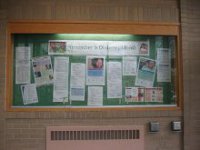
In November 2011, the NKFM used NDEP’s resources developed in support of National Diabetes Month. The organization distributed two press releases and several 10-, 15-, and 30-second public service announcements to communities with a high prevalence of diabetes. In addition, the NKFM promoted NDEP’s 4 Questions You Should Ask and Choose More than 50 Ways to Prevent Type 2 Diabetes resources on Facebook and Twitter. Toward the end November, the organization continued to promote National Diabetes Month via social media with the theme “Eating Healthy at Thanksgiving Dinner” using NDEP’s resources on eating healthy at family gatherings and special events.
In January, the NKFM promoted the theme “Get Healthy and Control Your Diabetes in 2012.” The organization encouraged people with and at risk for type 2 diabetes to make a New Year’s resolution to get healthy. The NKFM also adapted NDEP messages to create a press release promoting diabetes-related programs, classes, and activities throughout Michigan. Social media outreach included sharing NDEP’s New Year’s Resolution Maker on Facebook and motivating people to use the tool to set a goal for the New Year.
Throughout February, the NKFM promoted African American History Month utilizing NDEP offerings targeted to African Americans. Press releases and social media outreach supported the message that African Americans are at higher risk for diabetes and offered links to the NDEP Facebook page and website.
Evaluation
Through evaluating outreach around these monthly promotional activities, the NKFM learned that the best way to communicate NDEP offerings is to distribute a wide variety of materials in a variety of media formats. The organization has been able to reach a large audience by using social media, print media, and word of mouth.
To learn more, contact Lindsay Bacon at lbacon@nkfm.org.
VSP Vision Care Adapts NDEP Resources to Meet the Needs of Eye Care Professionals, Patients, and the Community
Background
 With a doctor network of approximately
28,000 eye care professionals and 56 million members,
VSP Vision Care (VSP) is in a position to make a significant and far reaching
impact on a large number of Americans. As a not for profit company, VSP is committed
to giving back to the community and believes in improving health and quality of
life of millions of people. Making a positive impact on the diabetes epidemic is
a top company priority.
With a doctor network of approximately
28,000 eye care professionals and 56 million members,
VSP Vision Care (VSP) is in a position to make a significant and far reaching
impact on a large number of Americans. As a not for profit company, VSP is committed
to giving back to the community and believes in improving health and quality of
life of millions of people. Making a positive impact on the diabetes epidemic is
a top company priority.
Projects and Promotions
The VSP Eye on Diabetes campaign was designed to increase consumer awareness around
the importance of comprehensive eye care in detecting and managing diabetes as well
as support VSP network doctors with continuing education in providing this essential
care.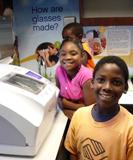 The campaign was launched in 2010 and has reached eight states throughout the country.
The campaign was launched in 2010 and has reached eight states throughout the country.
In partnership with the VSP Mobile Eyes Program, the National Diabetes Education Program (NDEP), State Optometric Associations, and local VSP network doctors, nearly 2,900 low-income, uninsured and underinsured people had access to free comprehensive eye exams, eyewear, and diabetes screenings. Of those, nearly 200 people were referred to their primary care physician for additional treatment. VSP also offers optometrists COPE-approved continuing education with two nationally recognized speakers who cover the PPOD disciplines along with other diabetes care guidelines.
VSP printed 4,200 copies of NDEP’s 4 Steps to Control Your Diabetes. For Life. booklet in English and Spanish to distribute at events in Lansing, Michigan; Atlanta, Georgia; and Los Angeles, California. The 4 Steps booklet is also available on the VSP website for doctors to print and give to patients and the organization will be making it available to members and benefit managers in the near future.
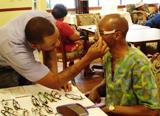 Additionally, VSP worked closely
with NDEP to develop a single page patient educational flyer that includes an authorization
for services for our members who have previously been identified as having diabetes,
diabetic retinopathy, hypertension, or high cholesterol. Developed as an easy-to-use,
ready-to-print handout, the flyer is a simple way for doctors to provide patients
information about their disease and how to get additional materials and resources
through NDEP.
Additionally, VSP worked closely
with NDEP to develop a single page patient educational flyer that includes an authorization
for services for our members who have previously been identified as having diabetes,
diabetic retinopathy, hypertension, or high cholesterol. Developed as an easy-to-use,
ready-to-print handout, the flyer is a simple way for doctors to provide patients
information about their disease and how to get additional materials and resources
through NDEP.
In partnership with NDEP, a positive impact has been made on the diabetes epidemic through outreach programs, education, and marketing tools.
To learn more, contact Jessica Hein, Outreach Coordinator, at jesshe@vsp.com.
Dr. Philip Rodgers, Clinical Pharmacist at Duke University Hospital, for Promoting NDEP Resources and a Team Approach to Diabetes Care in Clinical and Classroom Settings
Background
 Dr.
Philip Rodgers, a clinical pharmacist at Duke University Hospital, has
been promoting a health care team approach for diabetes management—which includes
pharmacists—for a number of years. As an NDEP partner, he has promoted the
use of NDEP’s web site and products
within his clinic, with his students, and with colleagues across the country. Dr.
Rodgers was a member of the NDEP’s Pharmacy, Podiatry, Optometry, and Dentistry
(PPOD) Work Group, which developed the booklet,
Working Together to Manage Diabetes, a guide for pharmacists, podiatrists,
optometrists, and dental professionals. Dr. Rodgers is currently working with the
American Pharmacists Association (APhA)
to develop a Diabetes Training Certificate Program for pharmacists which will incorporate
NDEP’s materials. He is a professional speaker on the diabetes management
team approach and speaks to health care professionals across the country.
Dr.
Philip Rodgers, a clinical pharmacist at Duke University Hospital, has
been promoting a health care team approach for diabetes management—which includes
pharmacists—for a number of years. As an NDEP partner, he has promoted the
use of NDEP’s web site and products
within his clinic, with his students, and with colleagues across the country. Dr.
Rodgers was a member of the NDEP’s Pharmacy, Podiatry, Optometry, and Dentistry
(PPOD) Work Group, which developed the booklet,
Working Together to Manage Diabetes, a guide for pharmacists, podiatrists,
optometrists, and dental professionals. Dr. Rodgers is currently working with the
American Pharmacists Association (APhA)
to develop a Diabetes Training Certificate Program for pharmacists which will incorporate
NDEP’s materials. He is a professional speaker on the diabetes management
team approach and speaks to health care professionals across the country.
Projects and Promotions
At the clinic, Dr. Rodgers runs a Diabetes Management Program where he provides diabetes control counseling, uses NDEP resources to help patients gain a better understanding of their disease, and optimizes the use of diabetes medications with physicians.
Due to access to patients, pharmacists often play a vital role in catching foot, eye, or oral complications that may develop and can recommend patients seek out a specialist, like a podiatrist, optometrist, or dentist. Dr. Rodgers is among a growing number of pharmacists who are using a collaborative approach with physicians and other health care providers to score the best outcomes for their patients.
As an NDEP partner, Dr. Rodgers is an advocate of the diabetes team care approach and frequently refers other health care professionals to NDEP’s website. Dr. Rodgers also promotes NDEP’s materials and website in the classroom. A clinical associate professor at the Eshelman School of Pharmacy, University of North Carolina, he directs his students to the materials located on the site, including the publication Diabetes Medications Supplement. This handy NDEP reference is a real hit among medical students and practitioners alike because it provides a table of the many medications used to manage blood glucose, blood pressure, and cholesterol and highlights the side effects and precautions of each.
Finally, Dr. Rodgers uses his professional affiliations to stress the importance of including pharmacists in diabetes management. He is often asked to speak at organizations across the country on the subject. Hoping to see more pharmacists become involved in diabetes management and education, he joined an APhA committee tasked with revising its Diabetes Certificate Training. The program, scheduled to be available next year, will incorporate NDEP materials into the training.
For more information, contact Dr. Rodgers at Philip.Rodgers@duke.edu.
Texas-based Día de la Mujer Latina Adapts NDEP’s Road to Health Toolkit for Bilingual Health Fiesta Training Program
 Día
de la Mujer Latina
Día
de la Mujer Latina![]() (Day of the Latin American
Woman) (DML) is a nonprofit, community-based grassroots organization approved by
the state of Texas as a sponsored certification training program for promotores
(community health workers). DML’s mission is to address the health disparities
in the Latino population through its innovative, culturally specific “health
fiesta” model. The organization’s strength lies in its coalition and
partnership building efforts with community-based organizations, local businesses,
regional and national government entities, health care providers, and key stakeholders.
(Day of the Latin American
Woman) (DML) is a nonprofit, community-based grassroots organization approved by
the state of Texas as a sponsored certification training program for promotores
(community health workers). DML’s mission is to address the health disparities
in the Latino population through its innovative, culturally specific “health
fiesta” model. The organization’s strength lies in its coalition and
partnership building efforts with community-based organizations, local businesses,
regional and national government entities, health care providers, and key stakeholders.
The DML Health Fiesta is designed to bring preventive health care services directly to the community. The bilingual training program consists of eight core competencies. As part of its knowledge-based skills portion, the DML Health Fiesta incorporates chronic disease prevention, using NDEP’s The Road to Health Toolkit as a roadmap.
 The
goals of the training include teaching participants how to:
The
goals of the training include teaching participants how to:
- Educate communities about the relationship between cancer, diet, nutrition, fitness, and obesity
- Promote cultural understanding in addressing diet, nutrition, and fitness
- Learn creative methods of communication to help clients to understand risk factors
- Develop and incorporate a culturally relevant nutrition and fitness plan into patients’ lives
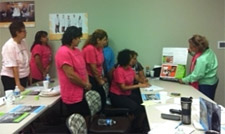 During the health fiestas held across Texas in 2011,
DML’s promotores were trained by Yajaira Lara, a certified diabetes instructor
who also has diabetes. Participants took turns conducting diabetes and hypertension
screening using their monitors. Many promotores participated in the educational
workshops, while others facilitated the screenings and motivated folks to do a Zumba
workout.
During the health fiestas held across Texas in 2011,
DML’s promotores were trained by Yajaira Lara, a certified diabetes instructor
who also has diabetes. Participants took turns conducting diabetes and hypertension
screening using their monitors. Many promotores participated in the educational
workshops, while others facilitated the screenings and motivated folks to do a Zumba
workout.
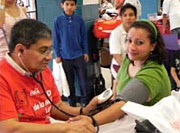 As
a result of the 2011 health fiestas, 161 promotores were trained using the curriculum
in The Road to Health Toolkit,
and 52 have gone on to address obesity and conduct screenings (using blood pressure
and glucose monitors) in their churches.
As
a result of the 2011 health fiestas, 161 promotores were trained using the curriculum
in The Road to Health Toolkit,
and 52 have gone on to address obesity and conduct screenings (using blood pressure
and glucose monitors) in their churches.
For more information, contact Venus Ginés at diadelamujerlatina@gmail.com.
National Latina Health Network Uses Web Channels to Promote NDEP’s National Diabetes Month
 The
National Latina Health Network (NLHN) promoted NDEP’s messages and materials
across a variety of web platforms during National Diabetes Month in November 2010.
NLHN worked with popular blogger SoLatina to promote awareness of gestational
diabetes (GDM). Working together, NLHN and SoLatina developed an article entitled
New Moms Can Prevent Diabetes by Keeping up Healthy Habits
The
National Latina Health Network (NLHN) promoted NDEP’s messages and materials
across a variety of web platforms during National Diabetes Month in November 2010.
NLHN worked with popular blogger SoLatina to promote awareness of gestational
diabetes (GDM). Working together, NLHN and SoLatina developed an article entitled
New Moms Can Prevent Diabetes by Keeping up Healthy Habits![]() .
The article encouraged Latina women with a history of GDM to get screened for diabetes
and to reach and maintain a healthy weight by being active and making healthy food
choices. SoLatina helped spread the word by posting the article on its Facebook
page and engaged followers by encouraging them to post comments on the article and
share their own experiences with gestational diabetes. By partnering
with SoLatina, NLHN was able to spread the word about gestational diabetes to more
than 33,000 Latina mothers.
.
The article encouraged Latina women with a history of GDM to get screened for diabetes
and to reach and maintain a healthy weight by being active and making healthy food
choices. SoLatina helped spread the word by posting the article on its Facebook
page and engaged followers by encouraging them to post comments on the article and
share their own experiences with gestational diabetes. By partnering
with SoLatina, NLHN was able to spread the word about gestational diabetes to more
than 33,000 Latina mothers.
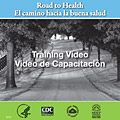 NLHN
also posted a link to NDEP on its Twitter
NLHN
also posted a link to NDEP on its Twitter![]() page and promoted NDEP’s
The Road to Health Toolkit Training Video on its YouTube page.
page and promoted NDEP’s
The Road to Health Toolkit Training Video on its YouTube page.
This year, to help partners follow in NLHN’s footsteps and shine a spotlight on diabetes during National Diabetes Month, NDEP has three easy ways for you to get involved:
- Link to the NDEP website: Post NDEP web buttons to your organization’s website and encourage your partners to do the same. Just like NLHN, you can help spread NDEP’s messages simply by linking back to the NDEP website!
- Share our articles: Post one of NDEP’s many ready-to-use articles on your website or in your organization’s newsletter. Follow NLHN’s example and work with a blogger or local media to reach your target audience.
- Engage using social media: Like and comment on Facebook posts, retweet NDEP messages, and share NDEP videos. Engage your social media followers as NLHN and SoLatina did by encouraging them to comment on your National Diabetes Month posts.
To learn more about the National Latina Health Network, visit
www.nlhn.net![]() .
.
Nevada Diabetes Prevention and Control Program (NDPCP) Uses NDEP's Road to Health Toolkit to Improve Self-care for Latino/Hispanic Communities
Background
 When
the Nevada State Health Division's Diabetes Prevention and Control Program (NDPCP)
set out to decrease the burden of diabetes in the Latino/Hispanic communities in
the state's southern region, the program focused on strategies to reduce the onset
of diabetes and ways to improve self-care. In response to Behavioral Risk Factor
Surveillance System (BRFSS) data, which showed that the Latino population had the
region's lowest rates of self-care, NDPCP began to develop a program to provide
free diabetes self-management education classes for Spanish-speaking residents who
had diabetes, were at high risk for developing diabetes, or cared for someone with
diabetes. Encouraging peer-to-peer education and inspiring behavior change in the
community were key goals.
When
the Nevada State Health Division's Diabetes Prevention and Control Program (NDPCP)
set out to decrease the burden of diabetes in the Latino/Hispanic communities in
the state's southern region, the program focused on strategies to reduce the onset
of diabetes and ways to improve self-care. In response to Behavioral Risk Factor
Surveillance System (BRFSS) data, which showed that the Latino population had the
region's lowest rates of self-care, NDPCP began to develop a program to provide
free diabetes self-management education classes for Spanish-speaking residents who
had diabetes, were at high risk for developing diabetes, or cared for someone with
diabetes. Encouraging peer-to-peer education and inspiring behavior change in the
community were key goals.
Outreach and Promotions
 NDPCP examined a range of evidence-based
tools and chose the U.S. Diabetes Conversation Map® program sponsored
by Merck to begin building a program that teaches self-management skills to patient
groups. However, the Conversation Map program only featured four sessions
and focused primarily on the emotional aspects of diabetes control. The
NDEP Road to Health Toolkit, available in English and Spanish,
provided the perfect complement to the Conversation Map program. NDPCP
incorporated components of the Road to Health Toolkit—including two
2-hour sessions on nutrition and physical activity—to create Road to a Healthier
You, a comprehensive 6-week classroom-based prevention program for Spanish-speaking
communities. NDPCP's Road to a Healthier You program earned the Centers
for Disease Control and Prevention's 2011 Frankie Award for promotion of NDEP resources
to address disparities.
NDPCP examined a range of evidence-based
tools and chose the U.S. Diabetes Conversation Map® program sponsored
by Merck to begin building a program that teaches self-management skills to patient
groups. However, the Conversation Map program only featured four sessions
and focused primarily on the emotional aspects of diabetes control. The
NDEP Road to Health Toolkit, available in English and Spanish,
provided the perfect complement to the Conversation Map program. NDPCP
incorporated components of the Road to Health Toolkit—including two
2-hour sessions on nutrition and physical activity—to create Road to a Healthier
You, a comprehensive 6-week classroom-based prevention program for Spanish-speaking
communities. NDPCP's Road to a Healthier You program earned the Centers
for Disease Control and Prevention's 2011 Frankie Award for promotion of NDEP resources
to address disparities.
Evaluation
Nearly 1 year into the project, Marjorie Franzen-Weiss, DPCP coordinator at the Nevada State Health Division, said, "The two programs are a natural fit…they complement each other very well."
Evaluation is being conducted at pre- and post-course and at 3- and 6-month intervals to determine changes in self-efficacy and health behavior. As of April 2011, preliminary findings indicated that:
- The majority of class participants (91%) were willing and able to start making changes in their daily lives to better manage their diabetes health.
- All of the participants who took both a pre- and post-test reported having set a goal or made a plan to start changing their daily lives to better manage their diabetes (health).
"This was our first year. We're in the building phase, so we don't have a lot of data yet." Franzen-Weiss added. "We are still trying to evaluate if the program is making a difference."
NDPCP praises the NDEP Road to Health Toolkit as "a wonderfully, culturally adapted piece" that has helped to magnify the reach and impact of the division's limited budget. As the program has unfolded, the key lesson learned, according to Franzen-Weiss, is that "you don't know what is going to work until you get started."
For more information about the Nevada State Health Division DPCP, contact Marjorie Franzen-Weiss, M.P.H., CHES, at maweiss@health.nv.gov.
Texas DPCP Develops Media Campaigns to Promote, Adapt NDEP Resources
 From
August 23 through September 12, 2010, the Texas Diabetes Prevention and Control
Program (DPCP) adapted NDEP’s “Paso
a Paso” diabetes prevention radio public service announcements (PSAs),
which aired in Corpus Christi, Houston, Laredo, and the Lower Rio Grande Valley,
Texas. The target audience—Hispanics/Latinos ages 25 to 54—heard the
spots an average of nearly 12 times in Corpus Christi, more than seven times in
Laredo and in the Lower Rio Grande Valley, and nearly 9 times in Houston, reaching
an estimated 750,000 listeners.
From
August 23 through September 12, 2010, the Texas Diabetes Prevention and Control
Program (DPCP) adapted NDEP’s “Paso
a Paso” diabetes prevention radio public service announcements (PSAs),
which aired in Corpus Christi, Houston, Laredo, and the Lower Rio Grande Valley,
Texas. The target audience—Hispanics/Latinos ages 25 to 54—heard the
spots an average of nearly 12 times in Corpus Christi, more than seven times in
Laredo and in the Lower Rio Grande Valley, and nearly 9 times in Houston, reaching
an estimated 750,000 listeners.
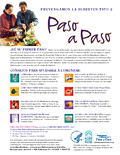 In
addition to radio, the Texas DPCP also utilized print media to extend the reach
of NDEP’s campaigns, messages, and resources. A print PSA was placed in the
diabetes issue of SmartSource magazine. Also, a coupon insert was placed
in Sunday newspapers in Corpus Christi, Laredo, Brownsville/Lower Rio Grande Valley,
and Galveston, with an estimated audience reach of nearly 5 million throughout the
state. In addition, the Texas DPCP utilized NDEP’s diabetes prevention messages
and print PSA artwork for a billboard in Laredo. The billboard directed viewers
to a diabetes education program being held at Mercy Clinic.
In
addition to radio, the Texas DPCP also utilized print media to extend the reach
of NDEP’s campaigns, messages, and resources. A print PSA was placed in the
diabetes issue of SmartSource magazine. Also, a coupon insert was placed
in Sunday newspapers in Corpus Christi, Laredo, Brownsville/Lower Rio Grande Valley,
and Galveston, with an estimated audience reach of nearly 5 million throughout the
state. In addition, the Texas DPCP utilized NDEP’s diabetes prevention messages
and print PSA artwork for a billboard in Laredo. The billboard directed viewers
to a diabetes education program being held at Mercy Clinic.
For more information about these promotions, contact Richard Kropp at Richard.Kropp@dshs.state.tx.us.
New York State Health Foundation (NYSHealth) Diabetes Campaign Hosts Road to Health Trainings
![]() The New York State Health Foundation (NYSHealth)
is halfway through a five-year campaign that was developed to address the diabetes
epidemic in New York state. One goal of the NYSHealth Diabetes Campaign is to build
on existing community resources and strengthen their capacity to provide education,
screening, and self-management support related to diabetes prevention and care.
NYSHealth believes that while there is an abundance of educational information related
to diabetes prevention and management, there are not enough qualified educators
in the communities that are most affected by diabetes to deliver these messages.
The New York State Health Foundation (NYSHealth)
is halfway through a five-year campaign that was developed to address the diabetes
epidemic in New York state. One goal of the NYSHealth Diabetes Campaign is to build
on existing community resources and strengthen their capacity to provide education,
screening, and self-management support related to diabetes prevention and care.
NYSHealth believes that while there is an abundance of educational information related
to diabetes prevention and management, there are not enough qualified educators
in the communities that are most affected by diabetes to deliver these messages.
In an effort to promote diabetes education to community health educators, NYSHealth utilized NDEP’s The Road to Health Toolkit to host two one-day Road to Health trainings (one in English and one in Spanish). NYSHealth invited community health workers, nurses, health educators, and dietitians. Criteria for attending the trainings included a basic working knowledge of diabetes, strong leadership skills, and a demonstrated ability to:
- access hard-to-reach populations
- develop trusting relationships with clients
- reflect the linguistic and cultural diversity of the population they serve
- address specific needs, such as adapting health regimens to family and community dynamics
Betsy Rodriguez, R.N, B.S.N., M.S.N., C.D.E., and Alexis Williams, M.P.H., C.H.E.S., from the Centers for Disease Control and Prevention (CDC) led the trainings. Participants—35 at each session—also signed up to receive invitations to participate in free monthly NYSHealth Diabetes Campaign webinars on topics, such as diabetes and depression in the Hispanic/Latino community, diet and exercise in diabetes management, diabetes group visits in primary care, foot care, and diabetes care. Participants also received a packet of NYSHealth Diabetes Campaign materials.
Evaluation
As part of the CDC’s and NYSHealth’s efforts to evaluate the training, each participant completed an evaluation form at the conclusion of the training. A sample of the evaluation data showed:
- 90 percent of participants reported being “very satisfied” with the training
- 100 percent of participants reported that the purpose, goals, and objectives of The Road to Health Toolkit were met through the presentation
- 75 percent of participants felt prepared to deliver the messages to people in their community or at their practice site
Due to the overwhelming demand for The Road to Health training, NYSHealth has organized two additional trainings, which will be conducted in Long Island, N.Y., where there is an increased need for diabetes self-management support and education among Hispanic/Latino and American Indian and Alaska Native communities.
For more information about how NYSHealth utilized NDEP’s The Road to Health
Toolkit to design training sessions, contact Wanda Montalvo, R.N., M.S.N.,
A.N.P. at Montalvo@nyshealth.org. To
learn more about NYSHealth, visit www.nysdiabetescampaign.org![]() .
.
New Hampshire Diabetes Education Program Collaborates with 16 Partners to Support NDEP’s National Diabetes Month Messages and Materials
 The New Hampshire Diabetes Education Program (NHDEP)
collaborated with partners and agencies throughout the state to spread NDEP’s
National Diabetes Month 2010 campaign messages, which focused on family health history
as a risk factor for diabetes.
The New Hampshire Diabetes Education Program (NHDEP)
collaborated with partners and agencies throughout the state to spread NDEP’s
National Diabetes Month 2010 campaign messages, which focused on family health history
as a risk factor for diabetes.
NHDEP encouraged community health centers, programs within the Division of Public Health Services (DPHS), and agencies throughout the state to get involved. Participants included agency Wellness Coordinators (WC), the NH Tobacco Prevention Control Program (TPCP), the Public Information Office, the Legislative Branch, the Department of Agriculture, and the Department of Transportation.
NHDEP assisted the following partners in promoting NDEP’s National Diabetes Month campaign messages and materials:
- Agency WCs encouraged state employees and their families to engage in diabetes prevention and/ or management behaviors.
- The NH TPCP distributed pledge cards and NDEP’s Small Steps. Big Rewards. Your GAME PLAN to Prevent Type 2 Diabetes: Information for Patients “Fat and Calorie Counter” to coordinate with the November Great American Smokeout campaign.
- NH’s October newsletter for state employees, State of New Hampshire Wellness Program News, and NHDEP’s partner newsletter, New Hampshire Diabetes Digest, included articles promoting NDEP’s campaign initiatives.
- NHDEP, NH TPCP, and DPHS coordinated a campaign kick-off event, which included a training session for WCs focused on the relationship between obesity and diabetes. During the event, the organizations distributed NDEP materials, including, Your GAME PLAN to Prevent Type 2 Diabetes: Information for Patients, Did You Have Gestational Diabetes When You Were Pregnant? What You Need to Know., 4 Steps to Control Your Diabetes. For Life., and Help a Loved One with Diabetes.
- NHDEP worked with the Public Information Office to issue a press release based on a template release developed by NDEP. The release featured quotes by the Commissioner of Health and Human Services and the Director of Public Health Services.
- The Legislative Branch hosted a “Healthy Snack Day.”
- The Department of Agriculture hosted a “Healthy Potluck Contest.”
- The NH Hospital coordinated a wellness fair.
- The Department of Transportation coordinated a Great American Smokeout run/ walk and provided participants with diabetes information.
Results
NHDEP motivated 16 out of 43 state agencies to participate in its overall efforts. This resulted in 185 pledges in honor of National Diabetes Month, 11 displays including NDEP materials in agency buildings, and email updates to state employees.
For additional information about NHDEP’s collaboration efforts, contact Marisa Lara at Marisa.Lara@dhhs.state.nh.us.
The Lexington-Fayette County Health Department Adapts NDEP’s Movimiento DVD for Local Support Group
Background
 The Lexington-Fayette County Diabetes Coalition offered
to sponsor the new walking DVD project in order to offer a more structured program
along with Latin movements to increase physical activity. The purpose of this project
was to meet the needs of Spanish-speaking support group members who were struggling
to find a tool to help expand their physical activity options. A local Zumba instructor
choreographed the Latin steps using six songs from NDEP’s
Movimiento por su vida soundtrack, as well as several purchased music
tracks. A local film group was contracted to produce and edit the DVD. Support group
members practiced several times a week for three months before the DVD was produced.
A local dance company donated their space for the video shoot. A total of 500 DVDs
were produced for a total expense of $6,500. This low cost reflected the multiple
cooperative partners that invested in this project, including: Bluegrass Community
Health Center, Kentucky Dance Sport, and the Keeneland Association.
The Lexington-Fayette County Diabetes Coalition offered
to sponsor the new walking DVD project in order to offer a more structured program
along with Latin movements to increase physical activity. The purpose of this project
was to meet the needs of Spanish-speaking support group members who were struggling
to find a tool to help expand their physical activity options. A local Zumba instructor
choreographed the Latin steps using six songs from NDEP’s
Movimiento por su vida soundtrack, as well as several purchased music
tracks. A local film group was contracted to produce and edit the DVD. Support group
members practiced several times a week for three months before the DVD was produced.
A local dance company donated their space for the video shoot. A total of 500 DVDs
were produced for a total expense of $6,500. This low cost reflected the multiple
cooperative partners that invested in this project, including: Bluegrass Community
Health Center, Kentucky Dance Sport, and the Keeneland Association.
Evaluation
In terms of evaluation, the program continues to track individuals who are using the DVD. Plans are underway to follow up in six months to evaluate how effective the DVD is in promoting daily physical activity.
For more information about this project, please contact Janey Wendschlag, R.N., B.S.N. at Janeyl.Wendschlag@ky.gov.
Deerghayu Foundation Utilizes NDEP’s Road to Health Toolkit in Rural Communities in India
Background
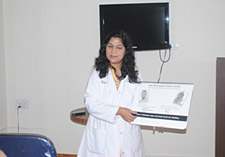 The Deerghayu Foundation
is a registered nonprofit organization with locations in Udaipur, Rajasthan, India
and Atlanta, Ga. The organization strives to make a difference in India by focusing
on helping people make behavior changes to prevent chronic noncommunicable diseases.
The foundation strongly believes in its motto, “Outreach, Innovate, and Prevent
Lifestyle Diseases,” and reaches communities in inner cities and villages
with innovative training methods where health care and knowledge about lifestyle
diseases are often scarce. Since its inception in the spring of 2010, the foundation
has reached more than 2,000 people in south eastern Rajasthan.
To learn more about the foundation or to see videos and photos of the training sessions,
click here
The Deerghayu Foundation
is a registered nonprofit organization with locations in Udaipur, Rajasthan, India
and Atlanta, Ga. The organization strives to make a difference in India by focusing
on helping people make behavior changes to prevent chronic noncommunicable diseases.
The foundation strongly believes in its motto, “Outreach, Innovate, and Prevent
Lifestyle Diseases,” and reaches communities in inner cities and villages
with innovative training methods where health care and knowledge about lifestyle
diseases are often scarce. Since its inception in the spring of 2010, the foundation
has reached more than 2,000 people in south eastern Rajasthan.
To learn more about the foundation or to see videos and photos of the training sessions,
click here![]() .
.
Research
The foundation conducted a door-to-door survey in six districts of south eastern Rajasthan to identify health needs in the community. Survey questions focused on hypertension and diabetes prevalence, family health history, awareness of diseases, frequency of medical care, and use of alternative medicine. The survey results guided the development and design of a comprehensive pilot program for diabetes awareness and behavior change—a challenge in a large country area with very few doctors and no system of diabetes educators. A comprehensive review of existing diabetes tools guided the foundation to NDEP’s resources that address the needs of communities, particularly those targeting non-health care professionals. The goal of the pilot program is to evaluate the process of adapting NDEP’s Road to Health Toolkit to the needs of diabetes and hypertension detection camps at inner-city areas, remote villages, workplaces, residential complexes, and community centers.
Implementation
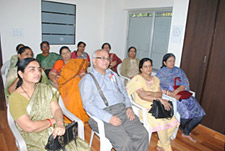 The foundation has developed
and utilized several educational tools including the Road to Health Toolkit.
The foundation utilized the toolkit through a special camp that was organized for
professors of the Meera Girls College. Classes were implemented in rural communities
to provide tips for healthy eating and disease prevention. Plans are underway to
adapt and customize the toolkit in Hindi and Gujarati languages and to the appropriate
skill level of rural health care workers.
The foundation has developed
and utilized several educational tools including the Road to Health Toolkit.
The foundation utilized the toolkit through a special camp that was organized for
professors of the Meera Girls College. Classes were implemented in rural communities
to provide tips for healthy eating and disease prevention. Plans are underway to
adapt and customize the toolkit in Hindi and Gujarati languages and to the appropriate
skill level of rural health care workers.
Results & Lessons Learned
Despite many health care system challenges for diabetes education and care that India is facing, participants at the clinic appreciate the “Traffic Light Method” and the way a human story is conveyed by a brother and sister pair. The key message of this toolkit—prevention—is very positive and is appreciated by the participants in the Indian culture. To date, more than 300 people in India have been educated using this toolkit.
For more information about this effort, contact Anand Chaturvedi at anandchaturvedi@gmail.com.
2011 Frankie Awards
 CDC’s
annual Division of Diabetes Translation (DDT) Frankie Awards, named in honor of
Frank Vinicor, M.D., former director of CDC’s DDT and a founder of NDEP, recognize
exemplary promotion and use of NDEP materials and messages in the past calendar
year (2010). Awardees were honored during a ceremony on April 11 as part of the
DDT meeting in Minneapolis, Minn. The Frankies are competitively judged and awarded
in five categories: Use of Media to Promote NDEP, Implementation of an NDEP Program
or Activity in the Community, Promotion of NDEP Resources to Address Disparities,
Collaborative Partnership Using NDEP Resources, and the Frank Vinicor Award of Excellence.
CDC’s
annual Division of Diabetes Translation (DDT) Frankie Awards, named in honor of
Frank Vinicor, M.D., former director of CDC’s DDT and a founder of NDEP, recognize
exemplary promotion and use of NDEP materials and messages in the past calendar
year (2010). Awardees were honored during a ceremony on April 11 as part of the
DDT meeting in Minneapolis, Minn. The Frankies are competitively judged and awarded
in five categories: Use of Media to Promote NDEP, Implementation of an NDEP Program
or Activity in the Community, Promotion of NDEP Resources to Address Disparities,
Collaborative Partnership Using NDEP Resources, and the Frank Vinicor Award of Excellence.
Award Winners
Kentucky Diabetes Prevention and Control Program
“Know the ABCs of Diabetes”
Use of Media to Promote NDEP – Use of traditional and nontraditional,
broadcast, print, electronic, social, or other media to promote diabetes prevention
and/or control using NDEP resources
The purpose of this activity was to raise awareness of the ABCs of diabetes (as measured by A1C, blood pressure, and cholesterol) and the importance of managing them for people with diabetes. The target audience was people with diabetes, with emphasis on the high-risk Appalachian and African-American populations. Raising awareness of the ABCs of diabetes through multiple channels encouraged those with diabetes to learn what their ABCs are and to make the necessary behavior changes (i.e., diet/physical activity modifications) to manage their diabetes and reduce the risks for diabetes complications. The Kentucky Diabetes Prevention and Control Program (KDPCP) and partners conducted a variety of activities to promote NDEP’s diabetes control (ABC) campaign messages and materials. Many media venues were used throughout the state including: billboards, television and radio programs, marquee/wall boards, newsletter and newspaper articles, material distribution, and websites. NDEP feature articles were distributed monthly by the KDPCP and Kentucky Diabetes Network Patient Education Work Group to all partners to be placed in local newsletters, newspapers, and magazines. Many NDEP materials, such as 4 Steps to Control Your Diabetes. For Life.; If You Have Diabetes, Know Your Blood Sugar Numbers; Tips to Help You Stay Healthy and Take Care of Your Heart. Manage Your Diabetes., were distributed at health fairs and through displays, and diabetes classes. In addition, NDEP’s Know Your Diabetes ABCs Just Like You Know Your Other Numbers and You Don’t Need to Be a Superhero to Manage Your Diabetes. You Need to Control Your ABCs. messages were used on billboards. Also, “Managing diabetes is not easy, but it’s worth it to prevent or delay complications!” and other ABCs of diabetes messages were placed on payroll stubs or used as payroll stuffers. Several television and radio programs on the importance of knowing one’s ABCs and managing them were presented by diabetes staff from local health departments across the state. Many were broadcast in conjunction with and promoted local community diabetes activities. The KDPCP and partners report activities through the web-based CATALYST Diabetes. As of December 31, 2010, total exposure to diabetes control messages was reported as 27,809,604.
Utah Diabetes Prevention and Control Program, Alliance Community Services, National
Tongan American Society, Utah Nutrition Council, Tooele County Local Health Department,
and Utah County Local Health Department
“Go Local with NDEP!”
Implementation of an NDEP Program or Activity in the Community – Use of
NDEP resources to provide heath education one-on-one or in a group, such as in a
health care, worksite, school, faith-based, or other community setting
The purpose of this activity was to market NDEP materials and conduct activities using NDEP resources, while allowing community leaders to use their creativity. The Utah Diabetes Prevention and Control Program (DPCP) subscribes to the idea that messages heard from someone who is an actual member of the community will have a greater impact than messages that come from agencies that are less connected to the community. The target audiences included Hispanic/Latino, Pacific Islander, and American Indian communities; uninsured residents; and Utah county residents. This multi-community project was developed to encourage healthier lifestyles and self-management behaviors for people with and at risk for diabetes. The Utah DPCP funded the Utah county and Tooele county local health departments to develop diabetes coalitions and pilot test NDEP campaigns. The coalitions were comprised of diabetes professionals, community leaders, and people with diabetes. The coalitions were charged with adapting and disseminating NDEP messages and materials that suited the characteristics of their unique populations. To further encourage diabetes awareness through the use of NDEP materials, the Utah DPCP solicited applications from community organizations that worked with at risk Utahans. The Utah DPCP encouraged creativity and provided seed funding to assist successful applicants in their efforts. Each organization carefully tracks the number and types of NDEP materials distributed, and the estimated number of people reached. The Utah DPCP will publish the adapted NDEP materials on its website and announce their availability through its listserv. To date, this campaign has reached approximately 9,390 individuals directly. Among those, about 1,215 were diabetes professionals or community leaders who work with racial/ethnic minorities or other underserved populations at risk for diabetes. Therefore, the indirect reach is much greater.
Nevada Diabetes Prevention and Control Program
“Road to a Healthier You” in English and Spanish
Promotion of NDEP Resources to Address Disparities –
Use of NDEP resources to address populations disproportionately burdened by diabetes
(e.g., racial/ethnic minorities, people of low socioeconomic status, rural populations,
women, and people in some regions of the country)
The purpose of this activity was to decrease the risk of developing diabetes and its complications in the Hispanic/Latino population through a six-week, community-based diabetes education program. The program was developed to empower self-management, increase physical activity, and promote healthy weight and appropriate preventive medical care. The focus was to create an environmental change in Hispanic/Latino communities in Nevada. Clark County, located in Las Vegas, is the lead program with expansion to northern and rural Nevada. A six-week diabetes self-management and prevention course using NDEP’s Road to Health Toolkit in English and Spanish and the U.S. Conversation Maps, also available in English and Spanish, was developed. Evaluation is being conducted at pre- and post-course and three-month and six-month intervals to determine changes in self-efficacy and health behavior change.
California Diabetes Program
World Diabetes Day California State Capitol lighting event
Collaborative Partnership Using NDEP Resources – Partnership between work
groups, non-profit, private, and/or government organizations to disseminate materials
or implement public health initiatives using NDEP resources
This activity was a diabetes prevention and control public awareness and education event. The target audiences were people with and at risk for diabetes, health care decision makers, policy makers, and the media. This activity addressed risk reduction for diabetes and diabetes complications through healthy eating and physical activity. As a part of the World Diabetes Day campaign, the collaboration of partners recognized the need for diabetes awareness and education within the state of California. Information provided by the California Diabetes Program helped assess the need to plan and implement the event, and the World Diabetes Day campaign guided the collaboration to develop the event activities. NDEP messages, curricula, and materials helped to structure the event’s promotional materials, resources and public relations information. Through a partnership of the American Diabetes Association’s regional office in Sacramento, the California Diabetes Program, Juvenile Diabetes Research Foundation International, Sutter Health Foundation, private industry, and several Sacramento community-based organizations, public awareness outreach was planned and implemented. For instance, these organizations developed and obtained a state Governor’s Proclamation for diabetes awareness and hosted an event on the steps of the capitol. The event included more than 300 attendees, health fair exhibits, healthy food sampling, Jazzercise, soul line dancing, and inspiring speakers. This event was the perfect opportunity to feature NDEP’s messages, materials, and information, including the Power to Prevent: A Family Lifestyle Approach to Diabetes Prevention curriculum, the Power to Control Diabetes Is in Your Hands brochure, Small Steps, Big Rewards. Prevent Type 2 Diabetes and Control Your Diabetes. For Life. campaign materials, It’s Not Too Late to Prevent Diabetes, Choose More than 50 Ways to Prevent Type 2 Diabetes, Prevengamos la diabetes tipo 2. Paso a paso, and the Tips for Kids and Tips for Teens tip sheet series. More than 300 people attended the event. In addition, the event was featured on the evening news of six local news stations. The Governor’s Proclamation was featured on the state of California’s website and the event was promoted through the World Diabetes Day and California Diabetes Program’s websites.
Utah Diabetes Prevention and Control Program, Alliance Community Services, National
Tongan American Society, Utah Nutrition Council, Tooele County Local Health Department,
and Utah County Local Health Department
“Go Local with NDEP!”
Frank Vinicor Award of Excellence - This is the highest award given by NDEP
and is for exemplary use or adaptation of NDEP resources in a comprehensive, multifaceted
initiative to address behavior change
For program details, see “Implementation of an NDEP Program or Activity in the Community” description above.
Honorable Mentions
 Use
of Media to Promote NDEP:
Use
of Media to Promote NDEP:
- Diabetes and Prediabetes Media Campaigns
U.S. Virgin Islands Diabetes Prevention and Control Program - Reaching People Where They Are… For Good Health
Alabama Diabetes Prevention and Control Program
Debra Griffin, LaMont Pack, Sally Palmer, Karl Bryant, Kathy Blaze , Pam Craig, Demetra Peoples, Representative Mary Sue McClerkin, Mayor Omar Neal, Lillie Hall, Benjamin Moreira, Carolyn Bern, Arrol Sheehan, Takenya Taylor, Farmers Convention staff, Alabama Department of Environmental Management staff, Montgomery Therapeutic Center staff, and Maxwell Air Force Base
Implementation of an NDEP Program or Activity in the Community:
- Taking Ownership of Your Diabetes
University of Kentucky
Margaret E. Cook-Newell, Ph.D., R.D., L.D., C.D.E.; Hazel Forsythe, Ph.D., R.D., L.D., C.F.C.S.; Irene Hong-McAtee, M.D., M.C.R.; Laura Hieronymus, M.S. Ed., A.P.R.N., B.C.-A.D.M., C.D.E.; Stephen D. Perry, M.S., R.D., L.D.; Pam Sigler, M.S.; Lynn Blankenship, M.S.; Cheryl Case, M.S.; Ann Hollon; Theresa Scott, M.S.; Tamara Thomas M.S.; and Adrienne Glodt
Promotion of NDEP Resources to Address Disparities:
- Cenando con Diabetes en Pennsylvania
Penn State Cooperative Extension - Healthy Communities Start with You
National Kidney Foundation of Michigan
Jodi Burke, Art Franke, Laurie Gustafson, Ruth Kaleniecki, Kristie King, Wendy Lombard,
Jerry Yee, M.D., Michigan Department of Community Health, CHASS-REACH Detroit, Henry Ford Health Systems, Arab Community Center for Economic and Social Services, Detroit Area Agency on Aging, Health Alliance Plan, Omnicare Health Plan, Greater Detroit Area Health Council, Detroit Department of Health and Wellness Promotion, Wayne County Department of Public Health, federally-qualified health centers, area primary care providers, hospital and physician associations, senior centers, faith-based and other community groups that refer participants to the programs - The Links to Chronic Kidney Disease: Diabetes, High Blood Pressure,
and Family History community program
Wisconsin Diabetes Prevention and Control Program
Collaborative Partnership Using NDEP Resources:
- La Familia Diabetes Prevention Awareness and Screening Exhibit in St.
Paul, Minn.
Minnesota Diabetes Prevention and Control Program
Marsha Hughes, HealthEast Diabetes Care System and St. Paul Lion’s Club; Sheryl Grover, Minneapolis-St. Paul YMCA Diabetes Prevention Program; Rita Mays, Minnesota Diabetes Program; and Minnesota Department of Health - The Ohio Gestational Diabetes Mellitus (GDM) Collaboration
Division of Family and Community Health Services, the Office of Healthy Ohio Diabetes Prevention and Control Program, and the State Epidemiology Office - The Massachusetts Diabetes Education Program Coalition: Working Together
to Manage Diabetes
Massachusetts Diabetes Education Program
Alabama Department of Public Health Partners with NDEP for Diabetes Campaigns
 The
Alabama Department of Public Health’s Nutrition and Physical Activity Wellness
Program promoted its Walk at Work campaign during National Diabetes Month in November
2010. The campaign was endorsed by the state health officer and supervisors from
each of the bureaus and divisions at the health department, located at the RSA Tower
in Montgomery, Ala. Throughout the month, during 9:00 a.m. and 2 p.m. breaks, a
supervisor was scheduled to walk with employees who were interested in walking during
the break. The walks consisted of approximately 800 employees separated into groups
of three to five. Employees walked for 15 minutes, at least three times a week.
The program provided 900 copies of NDEP’s
Choose More than 50 Ways to Prevent Type 2 Diabetes tip sheet and
650 copies of NDEP’s
It’s Not too Late to Prevent Diabetes tip sheet to participants.
These materials were shared with 11 public health area sites in the state of Alabama
Worksite Wellness Program.
The
Alabama Department of Public Health’s Nutrition and Physical Activity Wellness
Program promoted its Walk at Work campaign during National Diabetes Month in November
2010. The campaign was endorsed by the state health officer and supervisors from
each of the bureaus and divisions at the health department, located at the RSA Tower
in Montgomery, Ala. Throughout the month, during 9:00 a.m. and 2 p.m. breaks, a
supervisor was scheduled to walk with employees who were interested in walking during
the break. The walks consisted of approximately 800 employees separated into groups
of three to five. Employees walked for 15 minutes, at least three times a week.
The program provided 900 copies of NDEP’s
Choose More than 50 Ways to Prevent Type 2 Diabetes tip sheet and
650 copies of NDEP’s
It’s Not too Late to Prevent Diabetes tip sheet to participants.
These materials were shared with 11 public health area sites in the state of Alabama
Worksite Wellness Program.
Through a collaboration with its Social Marketing department, Walmart, and Murphy Gas stations, the Alabama Department of Public Health developed another campaign, Gas Pump Toppers, which raised awareness of the signs and symptoms of diabetes as well as the complications. As part of the campaign, the Alabama Diabetes Program developed and marketed gas pump topper billboards. The ads also were included in the Alabama Pharmacy Association’s APA Journal and the Alabama health newsletter. From September through November 2010, Gas Pump Topper billboards were displayed at 120 gas stations across the state of Alabama, reaching more than 25 million people. During the month of December, Diabetes Program staff was interviewed on WFSA-TV NBC Channel 12 to discuss family health history as an important risk factor for developing diabetes.
Finally, on March 16, 2011, the Diabetes and Cardiovascular Health programs co-sponsored a satellite conference targeting the mental health community with a focus on preventing metabolic syndrome.
For more information about these promotions, contact Debra Griffin at Debra.griffin@adph.state.al.us or (334) 206-2066.
Nebraska Department of Health & Human Services Promotes NDEP’s School Guide During Telehealth Workshop
 The Nebraska Department of Health and Human Services
conducted a Diabetes Telehealth Workshop promoting the NDEP’s
Helping the Student with Diabetes Succeed: A Guide for School Personnel
utilizing the Nebraska School Nurse Telehealth Network. The Telehealth Network is
a valuable resource that provides education and information to multiple sites throughout
the state. Partners included: nurse managers, the Nebraska School Health Program,
the School Nurse Telehealth Network, diabetes educators, and the St. Elizabeth Regional
Medical Center.
The Nebraska Department of Health and Human Services
conducted a Diabetes Telehealth Workshop promoting the NDEP’s
Helping the Student with Diabetes Succeed: A Guide for School Personnel
utilizing the Nebraska School Nurse Telehealth Network. The Telehealth Network is
a valuable resource that provides education and information to multiple sites throughout
the state. Partners included: nurse managers, the Nebraska School Health Program,
the School Nurse Telehealth Network, diabetes educators, and the St. Elizabeth Regional
Medical Center.
At the conclusion of the workshop, participants were able to describe effective nursing diabetes management principles and the nurse’s role in the school setting. A certified diabetes educator from St. Elizabeth Regional Medical Center conducted the workshop, which focused on:
- encouraging use of NDEP’s School Guide
- raising awareness of the guide among school personnel
- accessing the guide from the NDEP website, www.YourDiabetesInfo.org/SchoolGuide
In addition, a resource sheet with information on the guide was provided to participants. To increase access to school personnel, a link to the guide was posted to the Nebraska School Health Program’s website.
An evaluation of the workshop showed that the majority of participants had positive feedback. The workshop reached a total of 21 sites throughout Nebraska, with 60 certificates of participation issued. Since Nebraska is a rural state, a larger number of school health nurses were reached via the Telehealth workshop.
To learn more about this promotion, contact Kathy Goddard at kathy.goddard@nebraska.gov or (402) 471-0194.
Frederick County Health Department Receives Model Practice Award for its Diabetes Prevention Program, Power to Prevent
 The
Frederick County Health Department was recently highlighted in NDEP’s March
Partner Spotlight
for launching Power to Prevent, a lifestyle diabetes prevention program
that utilizes NDEP’s
Power to Prevent: A Family Lifestyle Approach to Diabetes Prevention
curriculum. As a follow-up, NDEP is pleased to announce that the Frederick County
Health Department has received a Model Practice Award from the National Association
of County and City Health Officials’ Model Practice Program for its Power
to Prevent program. The overall goal of this program is to reduce the burden
of chronic disease by preventing or delaying the onset of type 2 diabetes and preventing
or delaying health complications associated with type 2 diabetes.
The
Frederick County Health Department was recently highlighted in NDEP’s March
Partner Spotlight
for launching Power to Prevent, a lifestyle diabetes prevention program
that utilizes NDEP’s
Power to Prevent: A Family Lifestyle Approach to Diabetes Prevention
curriculum. As a follow-up, NDEP is pleased to announce that the Frederick County
Health Department has received a Model Practice Award from the National Association
of County and City Health Officials’ Model Practice Program for its Power
to Prevent program. The overall goal of this program is to reduce the burden
of chronic disease by preventing or delaying the onset of type 2 diabetes and preventing
or delaying health complications associated with type 2 diabetes.
For more information about this program, contact Angela Blair at ablair@FrederickCountyMD.gov or (301) 600-1861.
The Massachusetts Diabetes Education Program Partners with NDEP to Emphasize the Importance of PPOD Professionals in Diabetes Care
Background
The Massachusetts Diabetes Education Program
(MDEP) Coalition![]() is a statewide coalition based on
the National Diabetes Education Program (NDEP) model. This unique MDEP Coalition
has a working group of member health providers that is developing a communications
program aimed at educating the public and its members regarding the important role
that the coalition’s providers play in diabetes management, education, and
prevention.
is a statewide coalition based on
the National Diabetes Education Program (NDEP) model. This unique MDEP Coalition
has a working group of member health providers that is developing a communications
program aimed at educating the public and its members regarding the important role
that the coalition’s providers play in diabetes management, education, and
prevention.
Coalition member pharmacist, podiatrist, optometrist, and dental care (PPOD) professionals are often a primary point of care for people with type 2 diabetes. Working with primary care providers, these professionals play an important role in ensuring that diabetes care is continuous and patient-centered. PPOD professionals educate people with diabetes about the disease, encourage them to practice self-management, provide appropriate treatment, and refer those who require the care of other health professionals.
Goals
The goals of the MDEP Coalition are to:
- Reinforce consistent diabetes prevention and management messages to patients
- Promote a team approach to comprehensive diabetes care
- Encourage collaboration among PPOD care providers to provide enhanced patient care and increase referrals to one another
- Promote diabetes prevention and provide diabetes management education to the public.
The core message of the MDEP is, “If you have diabetes, it’s important to know your blood sugar level, blood pressure, and cholesterol, and to review your medications with your pharmacist each year. It’s also important to bring all your medicines and visit your optometrist and podiatrist at least once a year and your dentist every six months to avoid serious, diabetes-related health problems such as blindness, foot amputations, drug interactions, and heart disease.”
Promotion and Outreach

The MDEP has conducted three education programs, including Yankee Dental Congress 2010 and 2011 and the American Podiatric Medical Association’s Region One conference. More than 650 Massachusetts PPOD providers have seen the PPOD panel presentation, and all materials developed were based on NDEP’s Working Together to Manage Diabetes: A Guide for Pharmacists, Podiatrists, Optometrists, and Dental Professionals, 2007. From late January to late February 2011, the MDEP ran a pilot media campaign that consisted of print, online, and radio public service announcements (PSAs) developed to reach African American and Hispanic/Latino communities. The timing of the campaign coincided with the Yankee Dental Congress MDEP panel presentation and breakout session. The PSAs urged people with diabetes to know their blood glucose, blood pressure, and cholesterol levels and to visit their PPOD medical management team at least annually and twice a year for dentists. Specifically, the PSAs were featured:
- In print publications such as El Planeta, Bay State Banner, and World Journal
- On radio stations such as WORC 1310 AM, WLLH 1400 AM, WACM 1490 AM, and WJFD 97.3 FM
- On local TV channels 4, 5, 6 and 7 and Telemundo
To view the TV PSAs, click here![]() .
.
The MDEP also has developed a bilingual website,
www.mdepcoalition.org![]() , which is available in English and
Spanish and links to the NDEP website. Lastly, the MDEP has developed an informational
video
, which is available in English and
Spanish and links to the NDEP website. Lastly, the MDEP has developed an informational
video![]() featuring various PPOD professionals providing tips to help people with diabetes
learn how to lower their risk for serious, diabetes-related health problems.
featuring various PPOD professionals providing tips to help people with diabetes
learn how to lower their risk for serious, diabetes-related health problems.
Lessons Learned
 “It
is paramount that the leadership of organizations be on board with the message.
Without the leadership support of the Massachusetts Pharmacists Association, Massachusetts
Podiatric Medical Society, Massachusetts Society of Optometrists, and Massachusetts
Dental Society committing staff time and money, this coalition would not have been
possible. The staff of the organizations were key in this program’s success.
We had a great team of talented professionals with which to work, said Lee Ball
O.D., F.A.A.O., an NDEP volunteer.
“It
is paramount that the leadership of organizations be on board with the message.
Without the leadership support of the Massachusetts Pharmacists Association, Massachusetts
Podiatric Medical Society, Massachusetts Society of Optometrists, and Massachusetts
Dental Society committing staff time and money, this coalition would not have been
possible. The staff of the organizations were key in this program’s success.
We had a great team of talented professionals with which to work, said Lee Ball
O.D., F.A.A.O., an NDEP volunteer.
For more information about this program, contact Dr. Ball at wleeballjr@hotmail.com or (978) 646-9093.
AADE Webinar Highlights NDEP’s School Guide
 In March, the American Association of Diabetes Educators
(AADE) coordinated a webinar entitled, “Kids and Diabetes: An Assessment of
Needs and Resources.” Moderated by Francine Kaufman, M.D., past NDEP chair,
the webinar covered:
In March, the American Association of Diabetes Educators
(AADE) coordinated a webinar entitled, “Kids and Diabetes: An Assessment of
Needs and Resources.” Moderated by Francine Kaufman, M.D., past NDEP chair,
the webinar covered:
- What kids and families need to manage diabetes and the resources available to them
- The neuropsychological effect of type 1 and type 2 diabetes on children
- The insulin pump and its role in the child's life
- How kids can manage diabetes at school
As part of the discussion, Dr. Kaufman referenced NDEP’s recently updated
Helping the Student with
Diabetes Succeed: A Guide for School Personnel as a resource for parents,
students, and school personnel.
To view upcoming 2011 AADE webinars, click here![]() .
To view or download the NDEP
School Guide or promotional toolkit, click here.
.
To view or download the NDEP
School Guide or promotional toolkit, click here.
Frederick County Health Department Utilizes NDEP’s Power to Prevent Curriculum in Diabetes Prevention Program
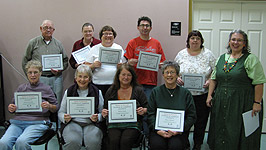 Background
Background
In November 2009, the Frederick County Health Department launched Power to Prevent, a lifestyle diabetes prevention program that utilizes NDEP’s Power to Prevent: A Family Lifestyle Approach to Diabetes Prevention curriculum. The overall goal of this program is to reduce the burden of chronic disease by preventing or delaying the onset of type 2 diabetes and preventing or delaying health complications associated with type 2 diabetes. People with and at risk for type 2 diabetes are eligible to join the program. Funding for this initiative was made possible by a three-year grant received from the Office of Chronic Disease Prevention of the Maryland Department of Health and Mental Hygiene. To achieve the overall goal, the Power to Prevent program has two primary objectives:
- Overweight participants lose 5 to 7 percent of their weight. Normal weight participants maintain their weight.
- Participants are moderately physically active for at least 30 minutes a day, five days a week.
The program’s third and less central objective is to get participants to see their health care providers for follow-ups and for those who are without a medical home to get them connected with a health care provider.
Participants attend one two-hour class per week for 12 weeks. Thirty minutes of class are dedicated to doing low-impact physical activity. Groups are co-led by a community lay educator and registered dietician (RD). Each participant also receives two individual sessions with the RD and is contacted by the department’s health access coordinator to ensure all participants have seen their health care provider in the past year or are connected with a provider if they do not have one.
The Frederick County Diabetes Coalition serves as the Advisory Committee for this project. Support and in-kind services are provided by at least 10 different community organizations/groups:
- New Dimension Worship Center
- Frederick County Extension Office
- Frederick Memorial Hospital Stroke Program
- Frederick Memorial Hospital Diabetes Program
- The Y
- If the Shoe Fits
- Mission of Mercy
- Hillcrest School Based Health Center
- Menocal Family Practice
- Centro Hispano
Lessons Learned
Some of the lessons learned and modifications made to NDEP’s Power to Prevent curriculum include:
- Use of a co-leader model for the entire 12-week program. A RD and community lay educator share responsibility for teaching each class lesson. More technical and complicated subjects are assigned to the RD.
- In addition to the 12 weeks of classes, participants are eligible for two individual nutrition counseling sessions with the RD.
- Class lessons are augmented with additional handouts. All handouts are also available in Spanish and information on certain subjects of interest, such as whole grains and healthy fish choices, have been added.
- Thirty minutes of each two-hour class are dedicated to doing a low-impact physical activity.
- Based upon participant feedback concerning tracking physical activity and foods eaten, participants are now routinely provided with websites where they can track this information online. Program leaders are also in the process of developing a more user-friendly hard copy tracker. In their experience, participants have a more difficult time recording foods eaten verses physical activity, so they continue to offer encouragement, support, and improved tools and resources. They also offer incentives based on how well participants track these activities and complete their weekly pledge.
- Participants have consistently given high marks for the grocery store tour, which they do for each 12-week cycle, the expert guest speakers, and the simple message of the program “Small steps lead to big rewards.”
- Additionally, participants have stated how important it is that the program is offered for free. Many have stated they simply would not have taken the class if there was a fee. Participants have also reported that the group support and accountability (discussion of food and physical activity trackers) influenced their behavior in positive ways.
Evaluation Results
One of the program’s primary objectives is that overweight participants lose 5 to 7 percent of their weight, and normal weight participants maintain their weight. The RD measures change in participants’ weight based on data collected pre-program, post-program and three months post program.
Based upon results from the 57 graduates who have completed pre/post program weight measurements, 18 percent of graduates lost 5 percent or more of their weight or maintained a normal weight. Among those who lost weight, the average weight loss was 3.2 percent. The number of graduates who lost any amount of weight was 82 percent. Using their pre-session weight as a benchmark, 79 percent of the 33 graduates who completed the three-month follow-up, have maintained their weight loss.
A second primary objective is that participants are moderately physically active for at least 30 minutes a day, five days a week. Participants complete a pre/post survey, which measures time and level of physical activity. Participants use food and activity trackers to record what they eat and their daily level of activity.
Based upon results from the 68 graduates who completed pre/post surveys, participants who engaged in 30 minutes or more of moderate physical activity or 20 minutes or more of vigorous physical activity per day, at least five days per week improved from 35 percent pre-program to 57 percent post-program.
For more information about this program, contact Angela Blair at ablair@FrederickCountyMD.gov.
Howard University Diabetes Treatment Center Utilizes NDEP Materials to Screen, Treat, Educate Local Residents
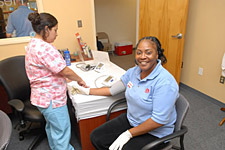 Background
Background
The Diabetes Treatment Center at Howard University Hospital, through a grant from the District of Columbia Department of Health, used a medical mobile unit to screen for diabetes and treat and educate people living with diabetes in Washington, D.C. The medical mobile unit is equipped with an electronic medical record that allows nurses, dietitians, and physicians to evaluate and treat patients in the community. The population served is largely African Americans living in the metropolitan area. As part of their education efforts, NDEP’s Power to Prevent: A Family Lifestyle Approach to Diabetes Prevention curriculum was utilized to plan and present their Prediabetes Education Workshop. In addition, NDEP’s It’s Not Too Late to Prevent Diabetes and Choose More than 50 Ways to Prevent Type 2 Diabetes handouts were regularly utilized in their community outreach efforts.
With the establishment of group medical visits, the center has found that NDEP’s Choose More than 50 Ways to Prevent Type 2 Diabetes tip sheet and Small Steps. Big Rewards. Your GAME PLAN to Prevent Diabetes Food and Activity Tracker were great tools to help encourage entire families to participate in the prevention and care of diabetes. In addition to hard copy resources, the center is using a web-based educational portal that allows patients to access other NDEP resources such as the If You Have Diabetes, Know Your Blood Sugar Numbers tip sheet and the “Five Facts About Diabetes” feature article, which includes a byline from Griffin P. Rodgers, M.D., M.A.C.P., Director, National Institute of Diabetes and Digestive and Kidney Diseases.
Results
All of these activities have improved patients’ diabetes care knowledge. This has resulted in an average A1C reduction of 1.33 from a baseline of 9.68 percent to 8.35 percent in the 141 patients reviewed from January to December 2010 who have participated in the diabetes education program using many of the NDEP materials.
For more information about this activity, contact Gail Nunlee-Bland, M.D. at gnunlee-bland@howard.edu or (202) 865-3350.
CareFirst BlueCross BlueShield Expands Its Promotion of NDEP Materials

CareFirst BlueCross BlueShield (CareFirst), the largest health care insurer in the
mid-Atlantic region, serving nearly 3.4 million members in Maryland, D.C. and northern
Virginia, recently expanded its promotion of NDEP resources. Headquartered in Owings
Mills, Maryland, CareFirst offers disease management programs for members with diabetes
and other chronic diseases. My Care First website provides members with
a range of health tools and other online educational resources. At
www.carefirst.com/diabetes![]() , users can find a series of diabetes
topics and links to additional resources, including the NDEP, NIDDK, National Diabetes
Information Clearinghouse, and CDC.
, users can find a series of diabetes
topics and links to additional resources, including the NDEP, NIDDK, National Diabetes
Information Clearinghouse, and CDC.
Earlier this year, CareFirst expanded its online resources for members by adding new NIDDK and NDEP links to its website, which draws more than 1,000 visitors daily. Among these links visitors can find:
-
“Tengo Diabetes,” NDEP’s Spanish-language website for people with diabetes (see carefirst.staywellsolutionsonline.com/spanish/Resources/
 )
) -
NIDDK as a source of online resources for members (carefirst.staywellsolutionsonline.com/Conditions/Diabetes/Resources/
 )
)
-
NDEP’s tip sheet for women with a history of gestational diabetes also is featured cfpregnancy.staywellsolutionsonline.com/MoreResources/

For several years, CareFirst has been featuring its co-branded version of the NDEP Spanish-language prevention tip sheet, Paso a Paso, at local events such as community and faith-based health fairs.
Joanne Drummond of the CareFirst health communications office said colleagues also promote NDEP resources in webinars for employers on workplace wellness. “What we really love about NDEP said is we can reproduce your material, and we know it’s reliable,” said Drummond.
For additional information, please contact Drummond at 410-998-5612, or joanne.drummond@carefirst.com.
CareFirst BlueCross BlueShield is an independent licensee of the Blue Cross and Blue Shield Association. ® Registered trademark of the Blue Cross and Blue Shield Association. ®' Registered trademark of CareFirst of Maryland, Inc.
Southern Jersey Family Medical Centers Adopts NDEP Materials for 2010 National Diabetes Month

In recognition of National Diabetes Month, in November 2010, Carol Mallette, M.A. of the Southern Jersey Family Medical Centers partnered with the New Jersey Maternal and Child Health Consortium, the New Jersey Chronic Disease Advisory Council, and the NJ Department of Health and Senior Services to organize Vital Links, a statewide Chronic Disease Summit. Ann Albright, Ph.D., R.D., Director, Division of Diabetes Translation, Centers for Disease Control and Prevention, served as keynote speaker for the event, which had more than 300 attendees. This event included a table with NDEP materials such as the 4 Steps to Control Your Diabetes. For Life. Asian-language adaptations, prevention tip sheets for African Americans and Hispanic/Latinos, and materials for youth. A large-scale, retractable banner adapted from NDEP’s More Than 50 Ways to Prevent Diabetes tip sheet was developed to attract visitors to the table. In terms of evaluation, nearly 90 percent of the materials were distributed to people who were – for the most part – unaware of NDEP. Overall, they received positive feedback regarding NDEP’s materials.
 In addition, Ms. Mallette coordinated the 10th
Annual Diabetes Day Fair in her state, which had more than 200 attendees. This event
included giving 125 flu shots, 28 pneumonia immunizations, 102 screenings, and blood
pressure checks. Also, 35 people participated in the healthy cooking demonstration
offered by the Atlantic Cape Community College’s School of Culinary Arts.
In addition, Ms. Mallette coordinated the 10th
Annual Diabetes Day Fair in her state, which had more than 200 attendees. This event
included giving 125 flu shots, 28 pneumonia immunizations, 102 screenings, and blood
pressure checks. Also, 35 people participated in the healthy cooking demonstration
offered by the Atlantic Cape Community College’s School of Culinary Arts.
During this event, she staffed another table with NDEP materials. Also, the Mayor attended this event and issued an official proclamation.
Ms. Mallette also tailored NDEP’s family history article for her organization’s needs. The feature article “What Is Your Family Health History?” included information about preventing diabetes and quotes from local doctors. The article was distributed to local newspapers and was featured in publications such as the Hammonton Gazette. In addition to the article, she ran an ad “You Have the Power to Prevent Diabetes” co-branded with the Southern Jersey Family Medical Centers’ and NDEP’s logos and distributed it to women’s magazines.
Finally, on November 13, 2010, Ms. Mallette coordinated a “Diabetes Talk” at a senior housing complex for approximately 36 attendees. During the presentation, older adults were encouraged to use NDEP’s free resources to manage or prevent diabetes.
To learn more about these activities, contact Carol Mallette at cmallette@SJFMC.org.
MOMS Orange County Conducts Diabetes Trainings Using NDEP’s Road to Health Toolkit
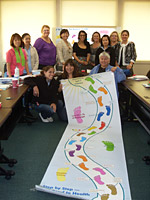 Program Leadership:
Program Leadership:
- Martha Londono, M.P.H., Ph.D., Diabetes Coordinator
- Yvette Bojorquez, B.A., R.N., Director of Client Services
Background:
The MOMS Orange County utilized NDEP’s Road to Health Toolkit (RTH) to train maternal child health coordinators and clinicians for its Pregnancy and Diabetes Prevention Program in Orange County, California. Staff was introduced to the RTH curriculum through engaging activities, personal self-assessments and group discussions. In addition, they were encouraged to apply strategies learned to home visits.
MOMS Orange County is a uniquely-qualified, community-based organization that provides access to prenatal care, health screenings, infant development screenings, health education and referral services through monthly home visits and group classes. Its mission is to help mothers and their families have healthy babies by providing health coordination, education and access to community services.
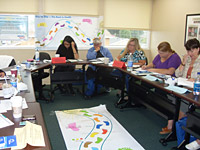
The MOMS Orange County’s model utilizes in-home health coordination and education to raise awareness of diabetes and to promote healthy habits through lifestyle change. Through screenings of pregnant women, those identified as having diabetes or at risk and in need of specialized coordination are automatically enrolled in the program. Each case is reviewed by registered nurse case managers and a diabetes care plan is developed with a focus on nutrition, exercise and maintaining blood glucose. For high-risk cases, a registered dietician supports the case managers. Program participants are encouraged to maintain blood glucose in their target range through proper nutrition and exercise, access appropriate medical care to promote healthy birth outcomes, and breastfeed their baby. The objectives of the program are to:
- Reduce the risk of developing gestational diabetes in women who are identified as high risk
- Improve birth and maternal outcomes for women with gestational diabetes and their babies
- Reduce the risk of women developing type 2 diabetes after pregnancy
- Lower the infant’s risk of developing diabetes, obesity and serious health problems later in life
Currently, MOMS Orange County is enhancing the program to include access to prenatal and postpartum classes and support groups focused on prevention, self-management and lifestyle change facilitated by a bilingual diabetes coordinator.
Trainer Feedback:
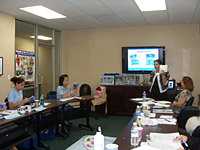 “I really liked the
aspect of the training in which we were challenged to think of ways to help our
clients incorporate exercise into their daily routine. It is often very hard for
a mother to take time away from her children or responsibilities to leave the house
for a walk outside. For example, clients often share that they will relax at the
end of their busy day for an hour watching novelas (Spanish-language soap operas).
We can suggest that perhaps they can do stretching exercises or some activity during
commercial breaks. This helped me to think of ways to make fitness and nutrition
reasonable and relevant to clients.” –Maria
“I really liked the
aspect of the training in which we were challenged to think of ways to help our
clients incorporate exercise into their daily routine. It is often very hard for
a mother to take time away from her children or responsibilities to leave the house
for a walk outside. For example, clients often share that they will relax at the
end of their busy day for an hour watching novelas (Spanish-language soap operas).
We can suggest that perhaps they can do stretching exercises or some activity during
commercial breaks. This helped me to think of ways to make fitness and nutrition
reasonable and relevant to clients.” –Maria
“The training really reminded me of how crucially important diet and exercise is for the health of everyone—even if you’re not diabetic. I really reflected on this truth, for both myself and clients.” –Monique
“I really took away that even if you are at risk for diabetes, there are a lot of things you CAN do to prevent the onset of diabetes. Just because it is in your genes does not mean you are doomed. It was really helpful to come to that understanding and know that we can help clients to pass on that information not only for themselves but for their families as well.” –Miriam
“The training really emphasized for me that even if you’re not obese or grossly overweight, you can still be at risk for developing diabetes. But you are able to make changes in your activity and eating habits. It was helpful to learn about portion sizes so now I am more conscious of what I eat (more fiber, less sugar). Also, I can share what I’ve learned and how I learned it through the training with clients.” –Martha
For more information, contact Julie Vo at
info@momsorangecounty.org or call (714) 972-2610. Visit the MOMS Orange
County website at www.momsorangecounty.org![]() .
.
The U.S.-Mexico Border DPCP Project Gets Inspired by NDEP’s Road to Health Photo Journal
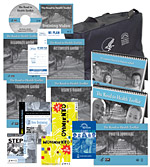 The
U.S.-Mexico Border Diabetes Prevention and Control (DPCP) project strongly believes
that community health workers or promotores de salud are an important part of the
diabetes health care team. From 2009 to 2010, the project delivered nine strategic
diabetes trainings across the border among this group and promotores showed not
only their enthusiasm for the trainings, but also, true commitment and loyalty to
NDEP products.
The
U.S.-Mexico Border Diabetes Prevention and Control (DPCP) project strongly believes
that community health workers or promotores de salud are an important part of the
diabetes health care team. From 2009 to 2010, the project delivered nine strategic
diabetes trainings across the border among this group and promotores showed not
only their enthusiasm for the trainings, but also, true commitment and loyalty to
NDEP products.
These unique trainings integrated the Diabetes Education Modules developed by the International Diabetes Federation and NDEP’s Road to Health Toolkit. On the first day of training, health care professionals and community health workers received the information side by side. Later, they were split up and trained with similar information, but tailored to their specific needs. On the last day of the training, they came together to develop an action plan for their markets or regions.
The trainings were very successful. Evaluation and follow up were outstanding.
Inspired by the toolkit’s Photo Journal, the project developed its own Binational
Photo Journal including the history of the U.S.-Mexico Border DPCP project, NDEP,
and the community health workers. As homage to the work of community health
workers, the Photo Journal captures promotores’ experiences in the trainings
and in the field. The Photo Journal can be found on the Pan American Health Organization’s
website at www.paho.org/fep/diabetes![]() .
.
Ohio DPCP Tailors NDEP’s November GDM Posters Using Real Employees and Their Children
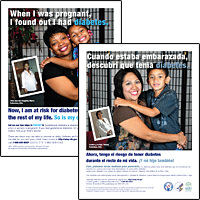 Background:
Background:
The Ohio Diabetes Prevention and Control Program (DPCP) is participating in a national gestational diabetes project sponsored by the Association of Maternal and Child Health Programs (AMCHP), the National Association of Chronic Disease Directors’ (NACDD) Women’s Health Council and the Centers for Disease Control and Prevention. The goals of the project are to:
- Foster collaboration between AMCHP and NACDD
- Utilize traditional social marketing techniques to increase public awareness of gestational diabetes and identify the link concerning healthy lifestyles and development of type 2 diabetes
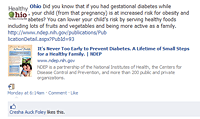 During
the 2010 National Diabetes Month, the Ohio DPCP partnered with NDEP to tailor and
co-brand the “Family Health
History: Gestational Diabetes” poster. An African American and Hispanic/Latina
employee of the Ohio DPCP, along with their children, were photographed to reach
populations disproportionately affected by diabetes in Ohio. In addition, the Ohio
DPCP worked with the Ohio Hispanic Coalition to translate one of the posters into
Spanish. Plans are underway to develop and disseminate a similar poster with a Caucasian
employee to reach the Appalachian region.
During
the 2010 National Diabetes Month, the Ohio DPCP partnered with NDEP to tailor and
co-brand the “Family Health
History: Gestational Diabetes” poster. An African American and Hispanic/Latina
employee of the Ohio DPCP, along with their children, were photographed to reach
populations disproportionately affected by diabetes in Ohio. In addition, the Ohio
DPCP worked with the Ohio Hispanic Coalition to translate one of the posters into
Spanish. Plans are underway to develop and disseminate a similar poster with a Caucasian
employee to reach the Appalachian region.
Promotion and Dissemination:
In November 2010, the posters were distributed with the Ohio DPCP’s quarterly newsletter to more than 1,500 diabetes care partners including, hospitals; Federally Qualified Health Centers; local health departments; Women, Infants and Children clinics; endocrinologists; primary care physicians; certified diabetes educators; registered dietitians; and selected OB/GYN practices. Information was also posted on the Healthy Ohio website and Facebook page.
To learn more about this promotion, contact Nancy D. Schaefer at Nancy.Schaefer@odh.ohio.gov or call (614) 728-3775.
Publications
The Road to Health Toolkit
(NDEP-111)
Designed for African Americans and Hispanics/Latinos at risk for type 2 diabetes, this tool kit provides materials to start a community outreach program reinforcing the message that type 2 diabetes can be delayed or prevented.Learn ...
Diabetes Community Partnership Guide
(NDEP-21)
This how-to kit contains ideas, tools, and guidelines to develop community partnerships to promote diabetes activities.
Resources
NDEP Publications List and Ordering Form
An up-to-date list of all available NDEP publications. Order form included.
Application Required
PDF files require the
free Adobe Acrobat Reader![]() application for viewing.
application for viewing.
All our publications are copyright-free. Please duplicate and distribute as many copies of these materials as desired. Online information may be more recently updated than printed materials.
Attention visually impaired visitors: To use common screen reading programs
with PDF documents, please visit
Accessibly Resource Center![]() , which provides a set of free tools
that convert PDF documents to simple HTML or ASCII text.
, which provides a set of free tools
that convert PDF documents to simple HTML or ASCII text.

